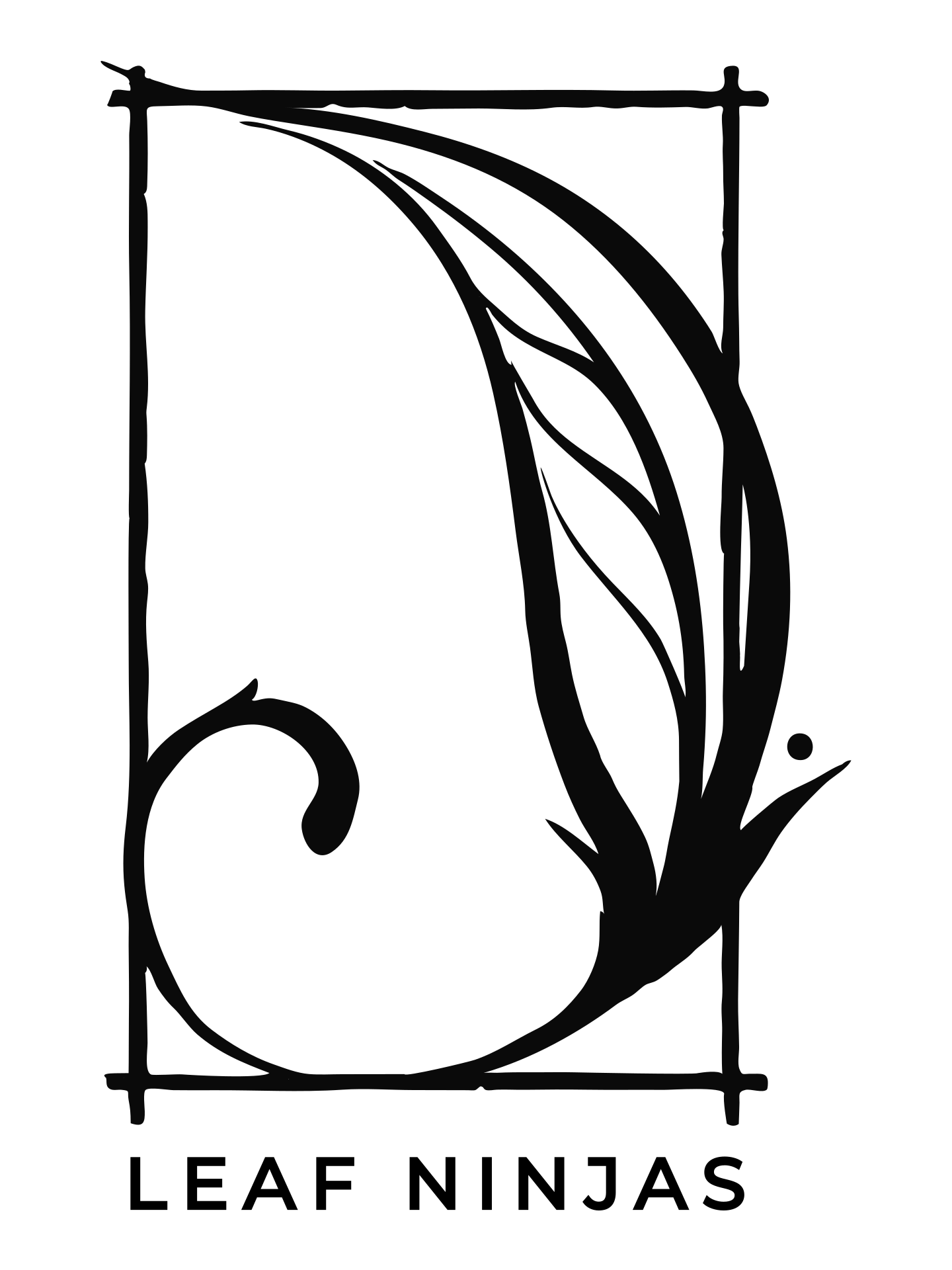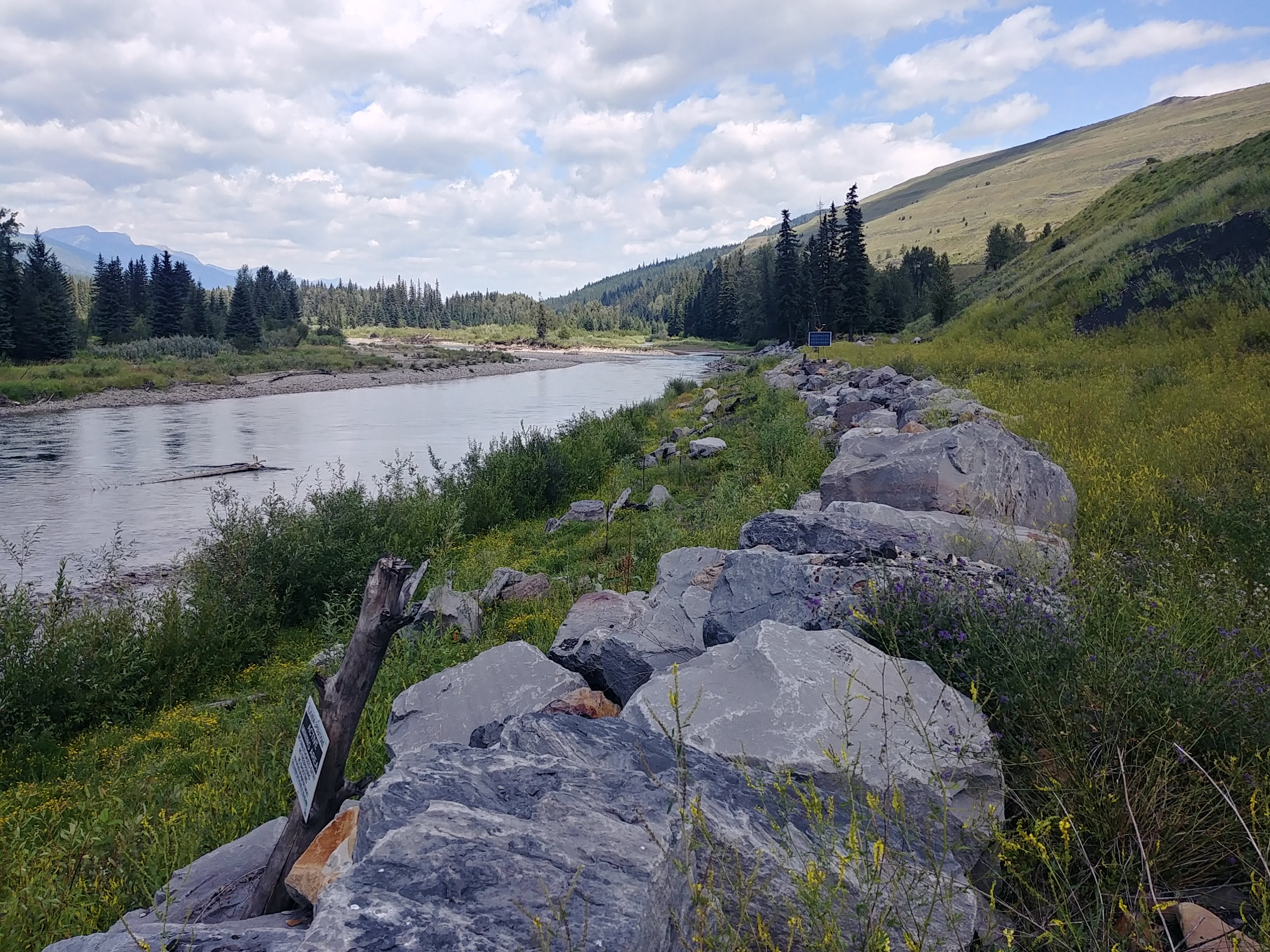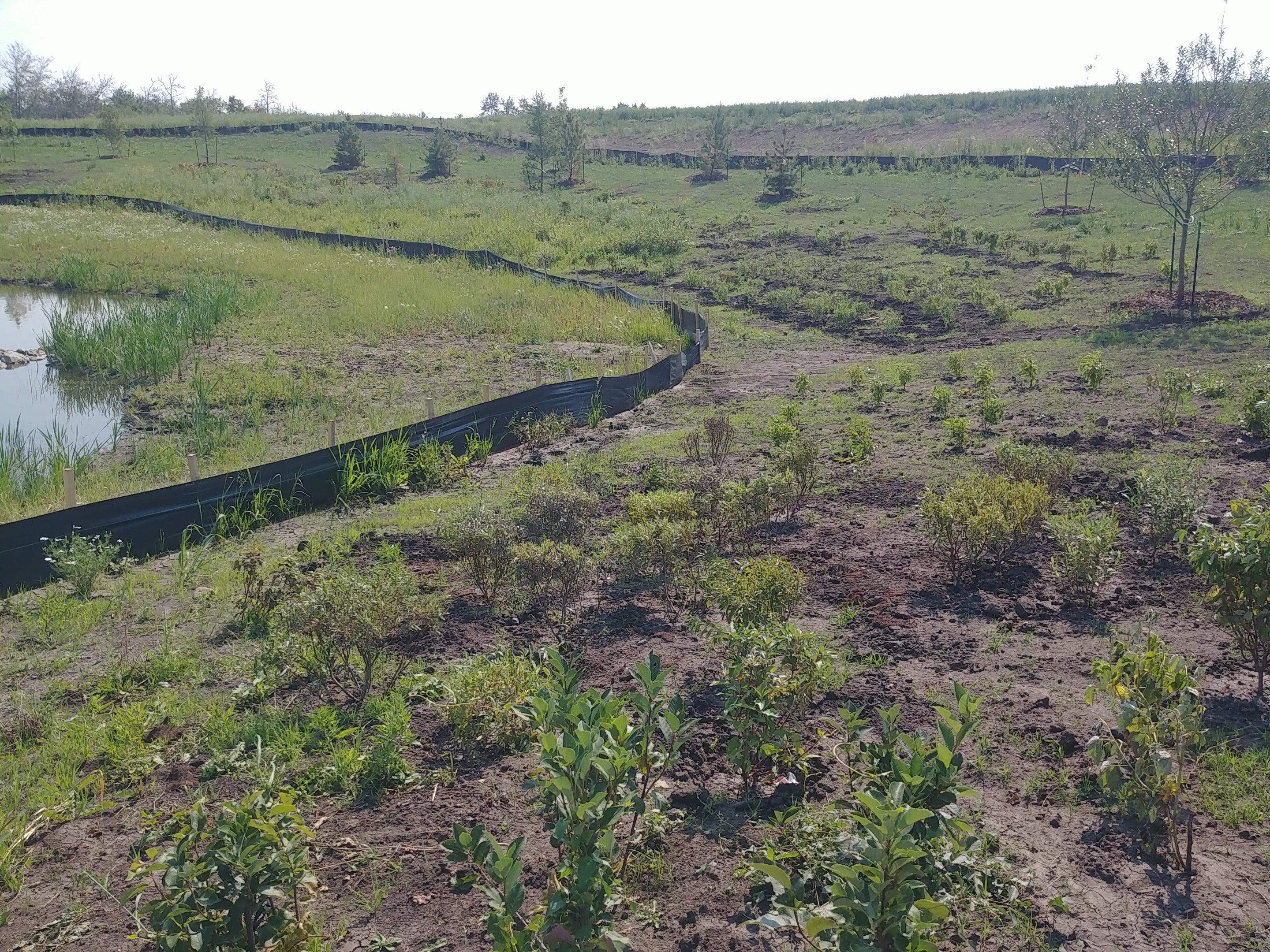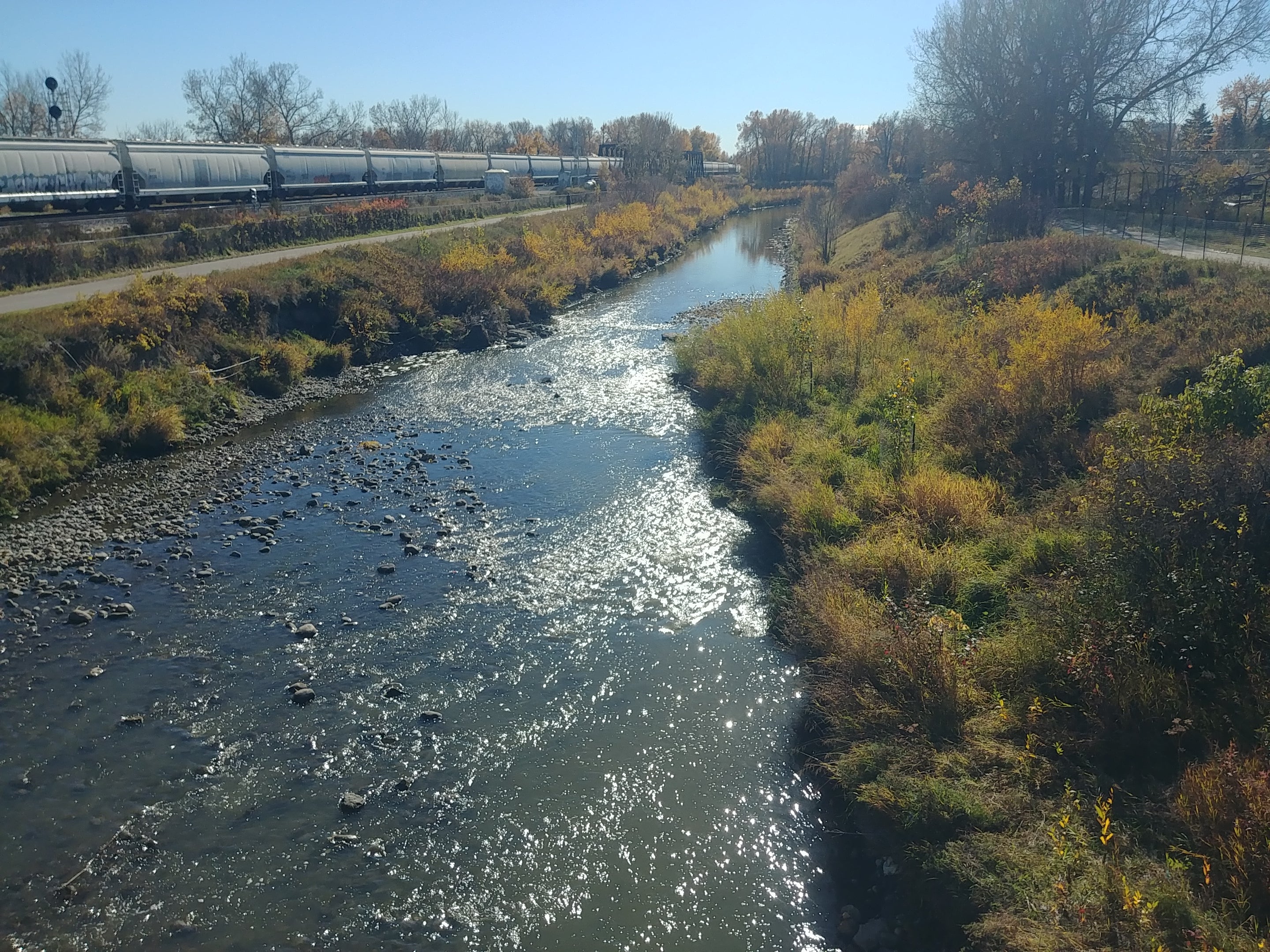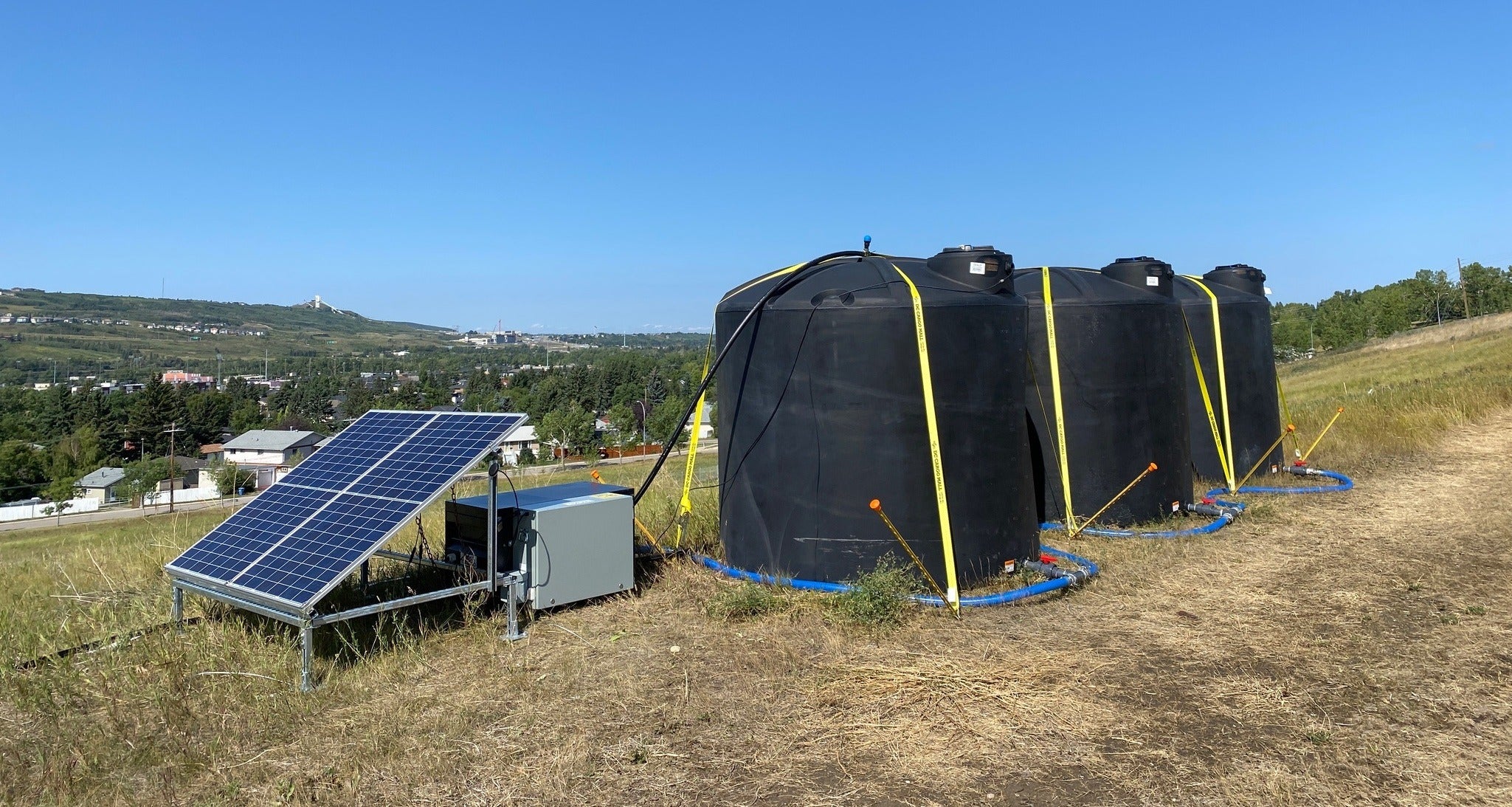Portfolio
Municipal, Developer/ Private Wetlands & Storm ponds, Solar Irrigation, Industrial Restoration/Reclamation,
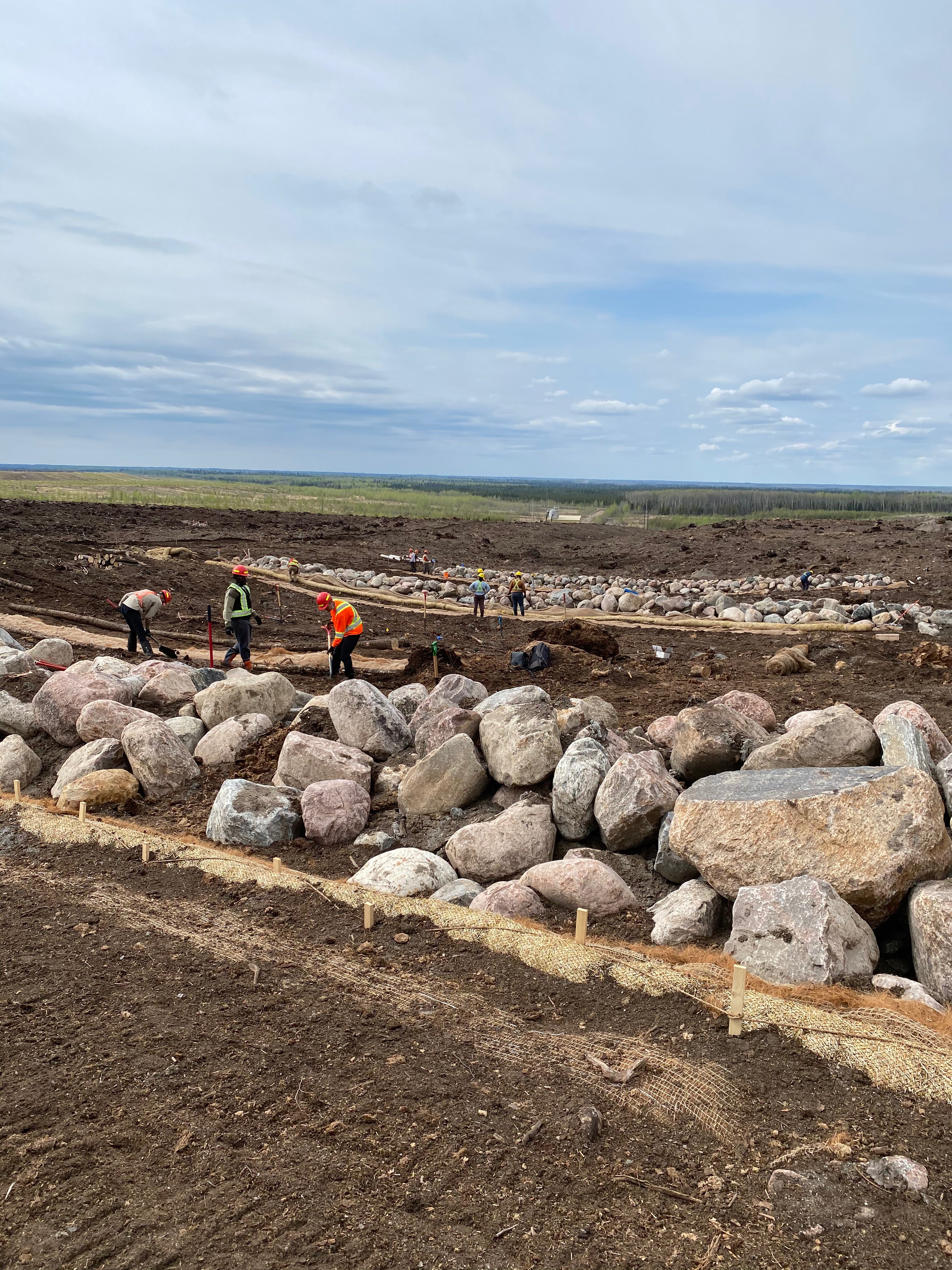
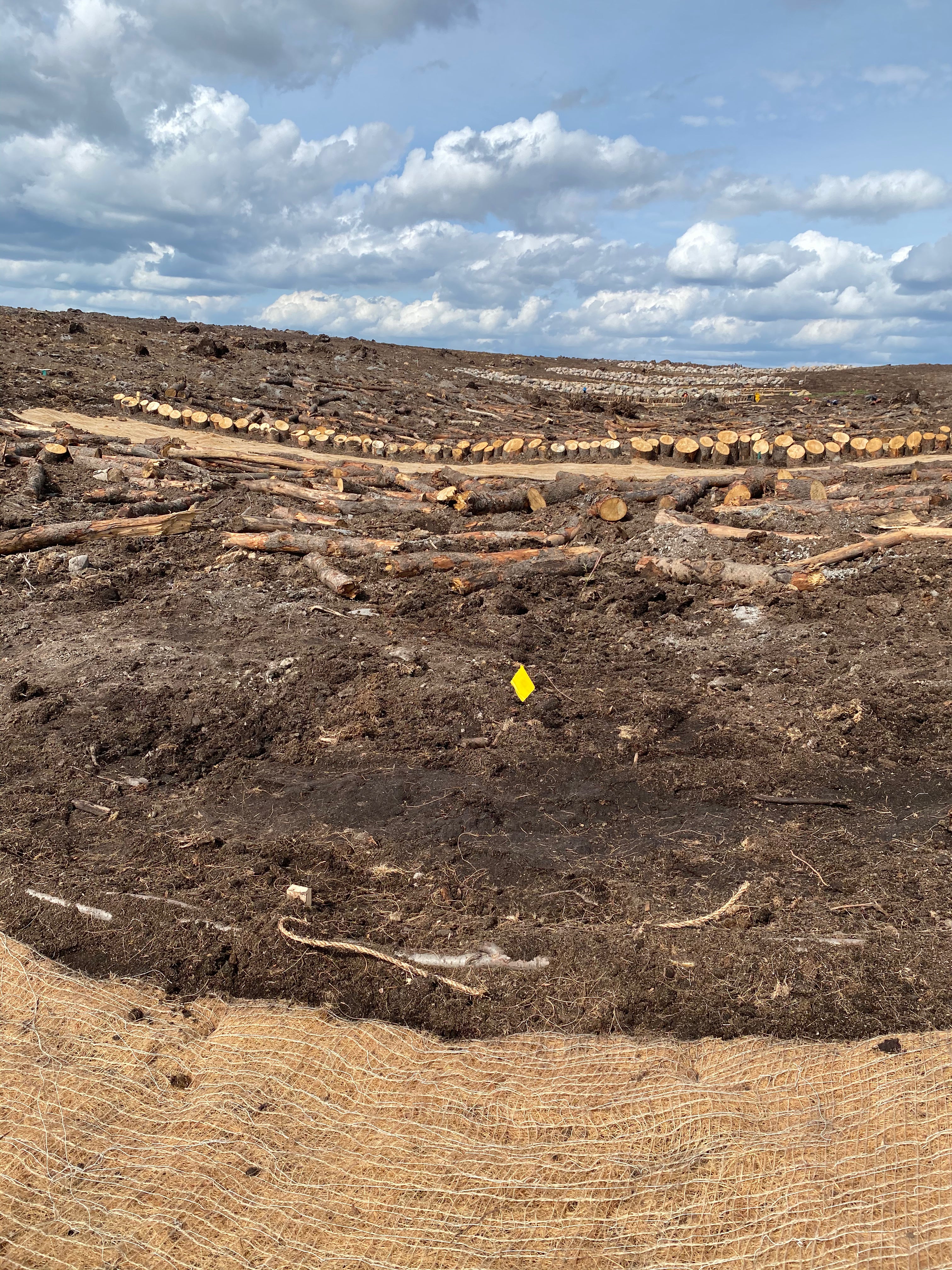
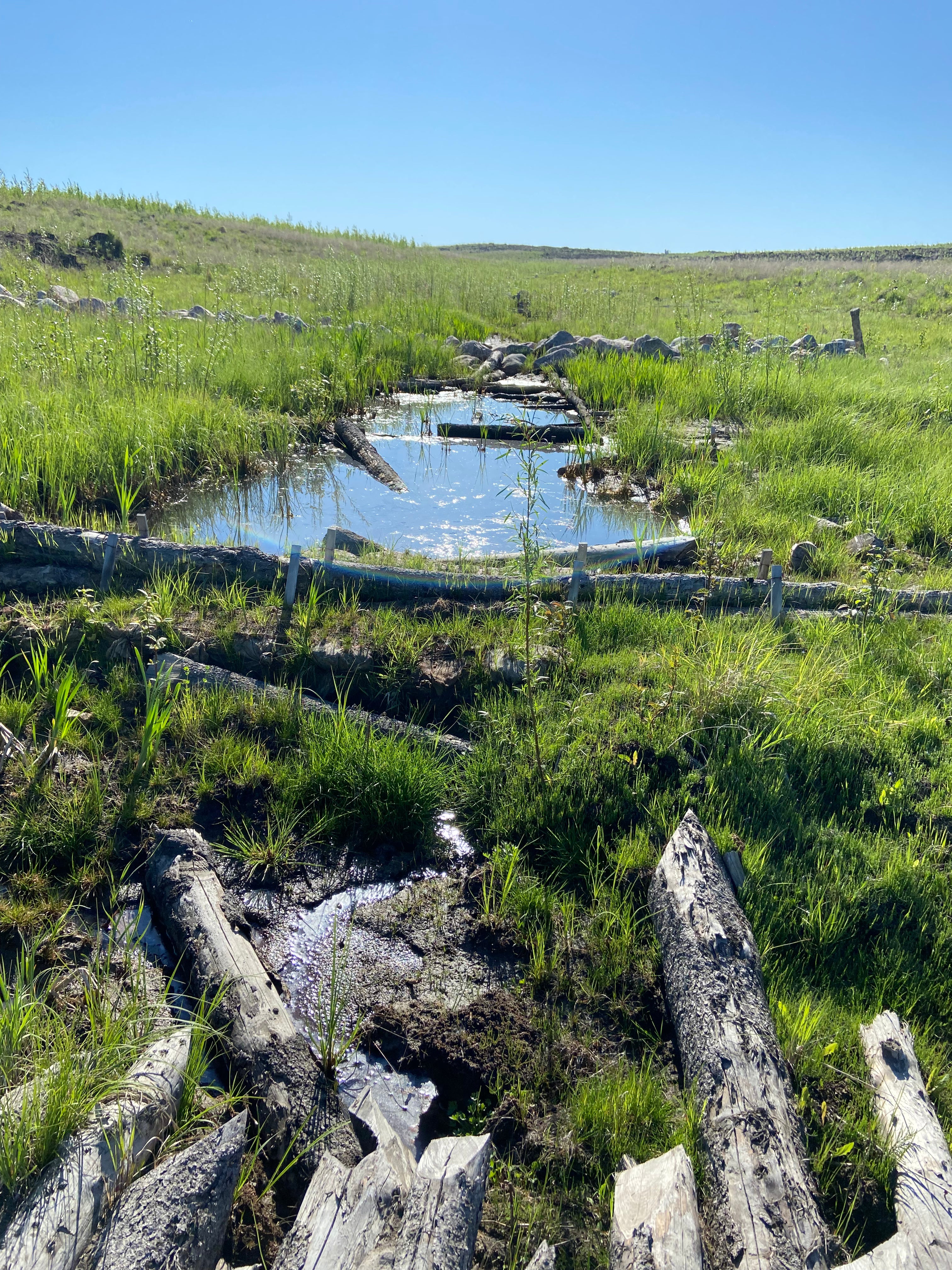
This multi-year endeavour involved 4-6 week seasonal operations during both the spring and fall seasons at an active mine site. The primary challenge was mitigating the adverse effects of overland water flow, which had been causing erosion on-site and in close proximity to tailing ponds. The project scope encompassed the installation of 3.5 kilometres of swale featuring soil bioengineering components, effectively addressing the issue.
This solution entailed the deployment of 40,000 live stakes and the construction of 200 specialized structures, including check slots, check dams, log structures, live fascines, and riprap, strategically placed to decelerate surface water flow. Additionally, our team undertook the crucial task of repairing the damage inflicted by third parties to the swale, ensuring the integrity of the ecosystem restoration efforts.
Further supporting the restoration initiative, we co-supervised the nurturing of 900,000 seedlings, contributing to the revitalization of the area's vegetation. In alignment with habitat preservation, stream realignment and the creation of beaver dam analogues were executed to foster habitat diversity and resilience. Continuous monitoring and comprehensive reporting of all work undertaken were integral to the project, ensuring the project's success and environmental sustainability.
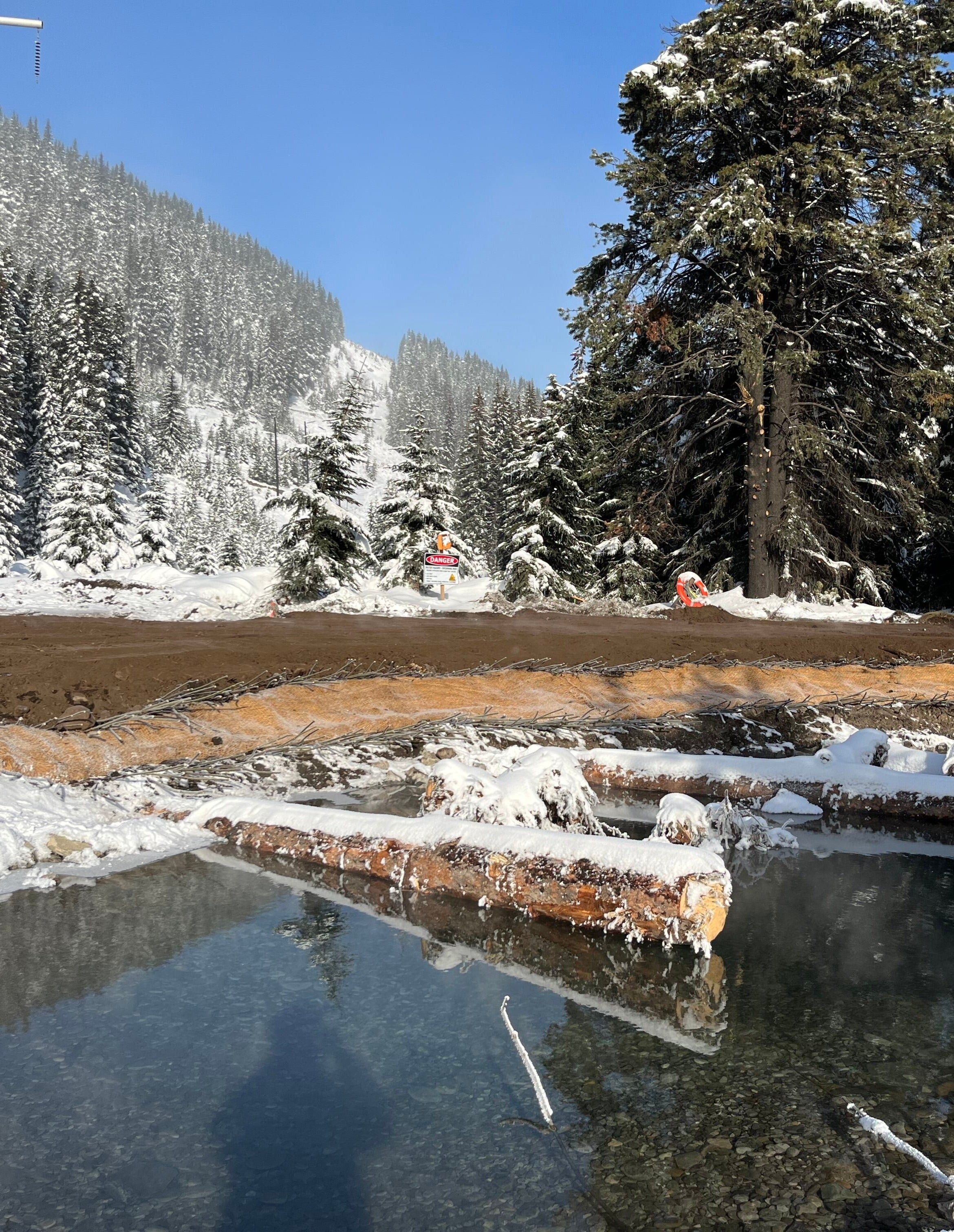
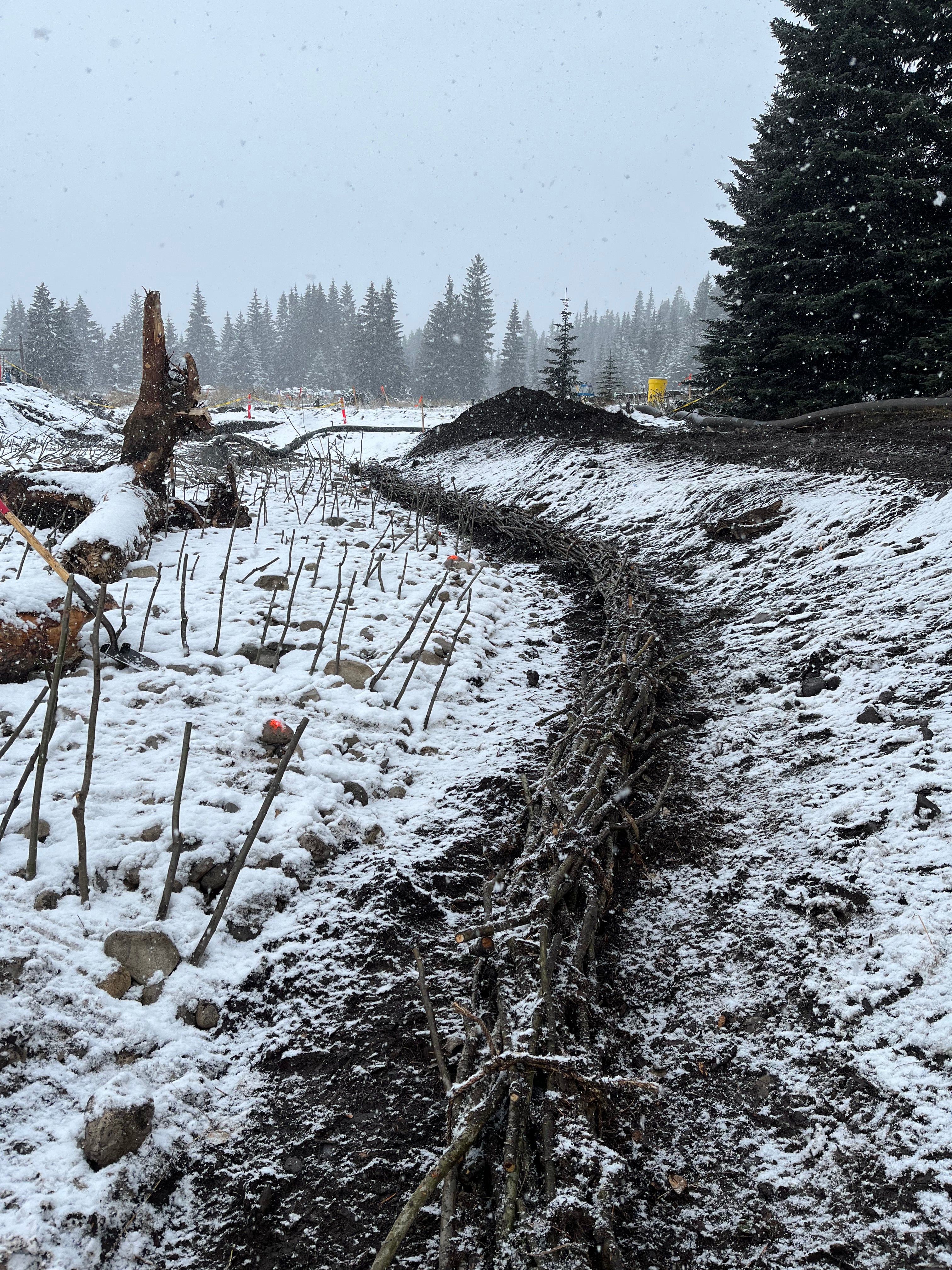
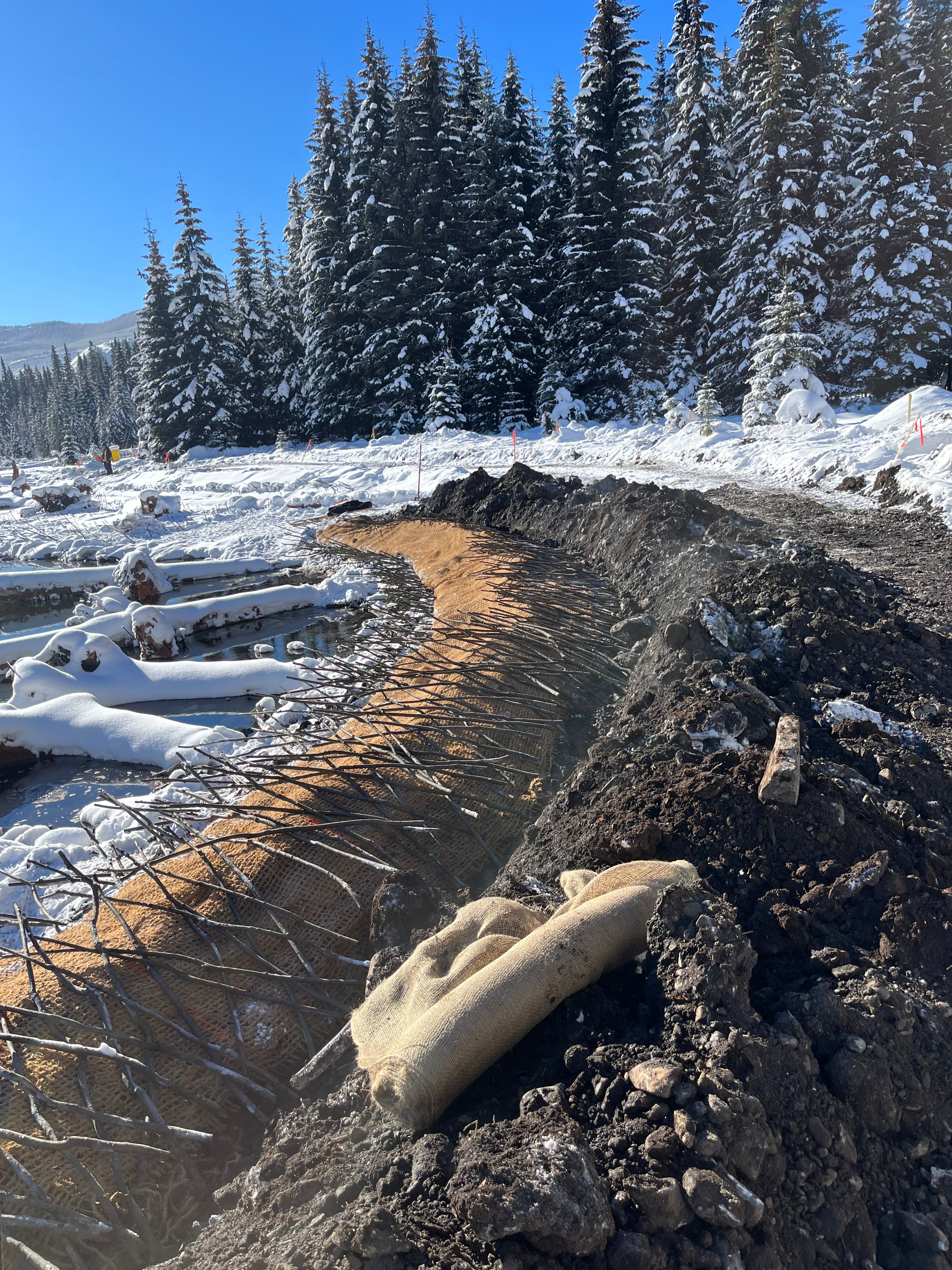
Serving as vegetation specialists and installation experts, LN collaborated closely with the prime contractor to execute the realignment of a stream. The primary objective was to stabilize riverbanks, establish new fish habitats, and safeguard onsite infrastructure through the application of diverse bioengineering methods.
This encompassed the installation of 118 meters of fascine bundles, equivalent to 3,010 live stakes meticulously harvested and constructed. In addition, 5,158 live stakes were harvested and skillfully deployed using a variety of bioengineering techniques. To optimize the project's success, we supplied and blended 315 cubic yards of soil amendments, implemented erosion control measures, and strategically placed coarse woody debris to enhance the fish habitat.
Our dedicated ground team ensured seamless coordination with machine operators throughout the stream construction process, effectively managing all aspects of machinery and operators required for the successful execution of the bioengineering elements.
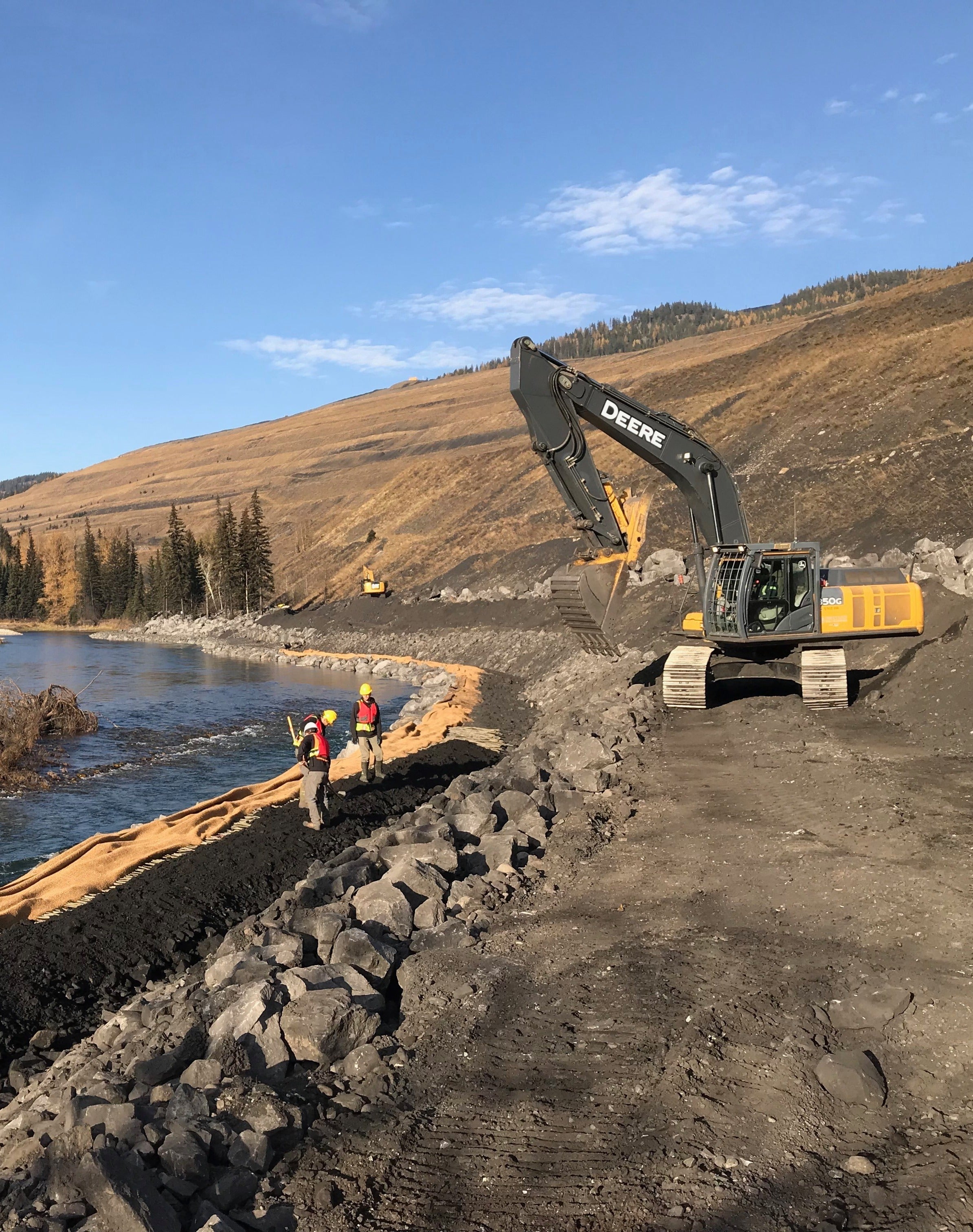
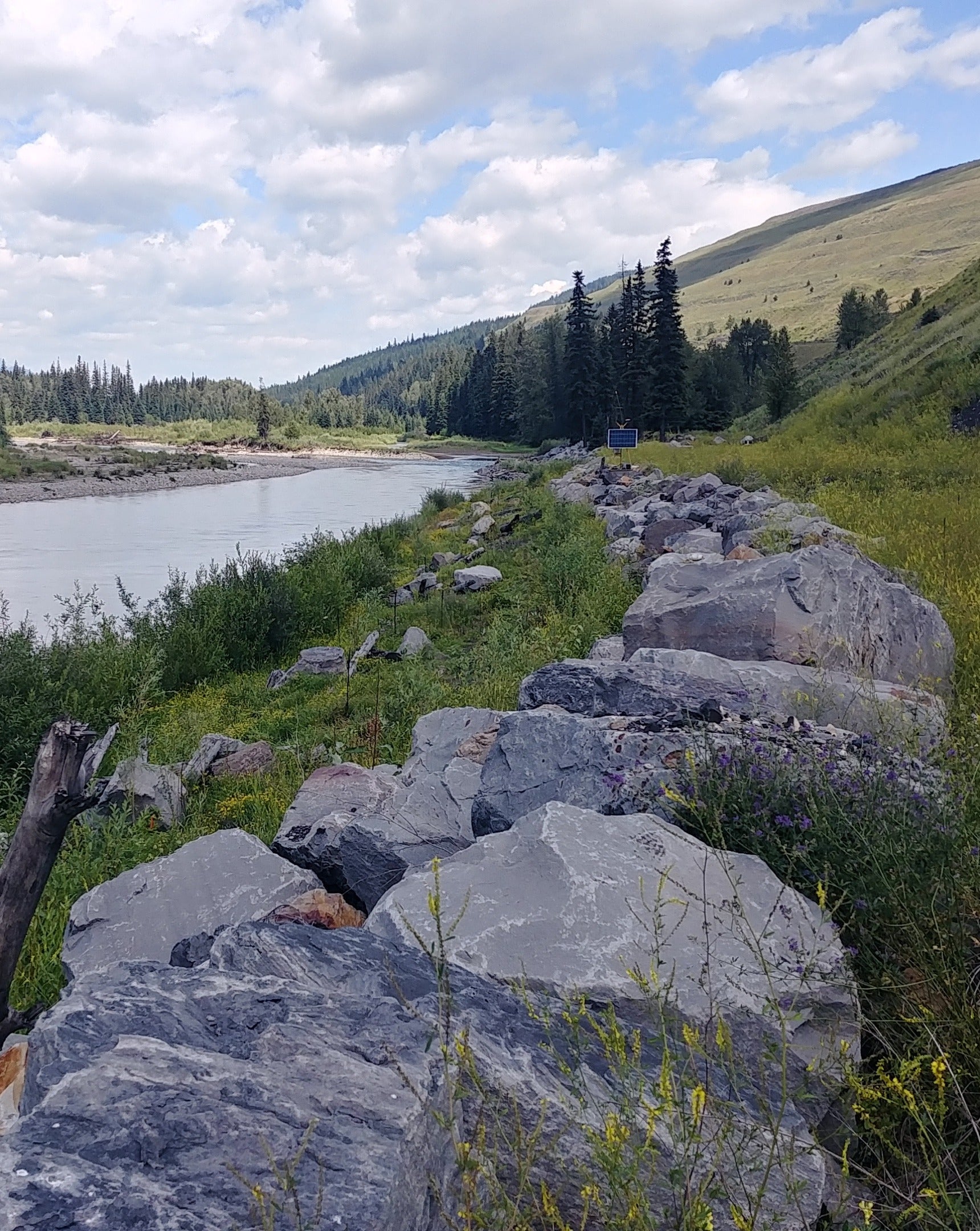
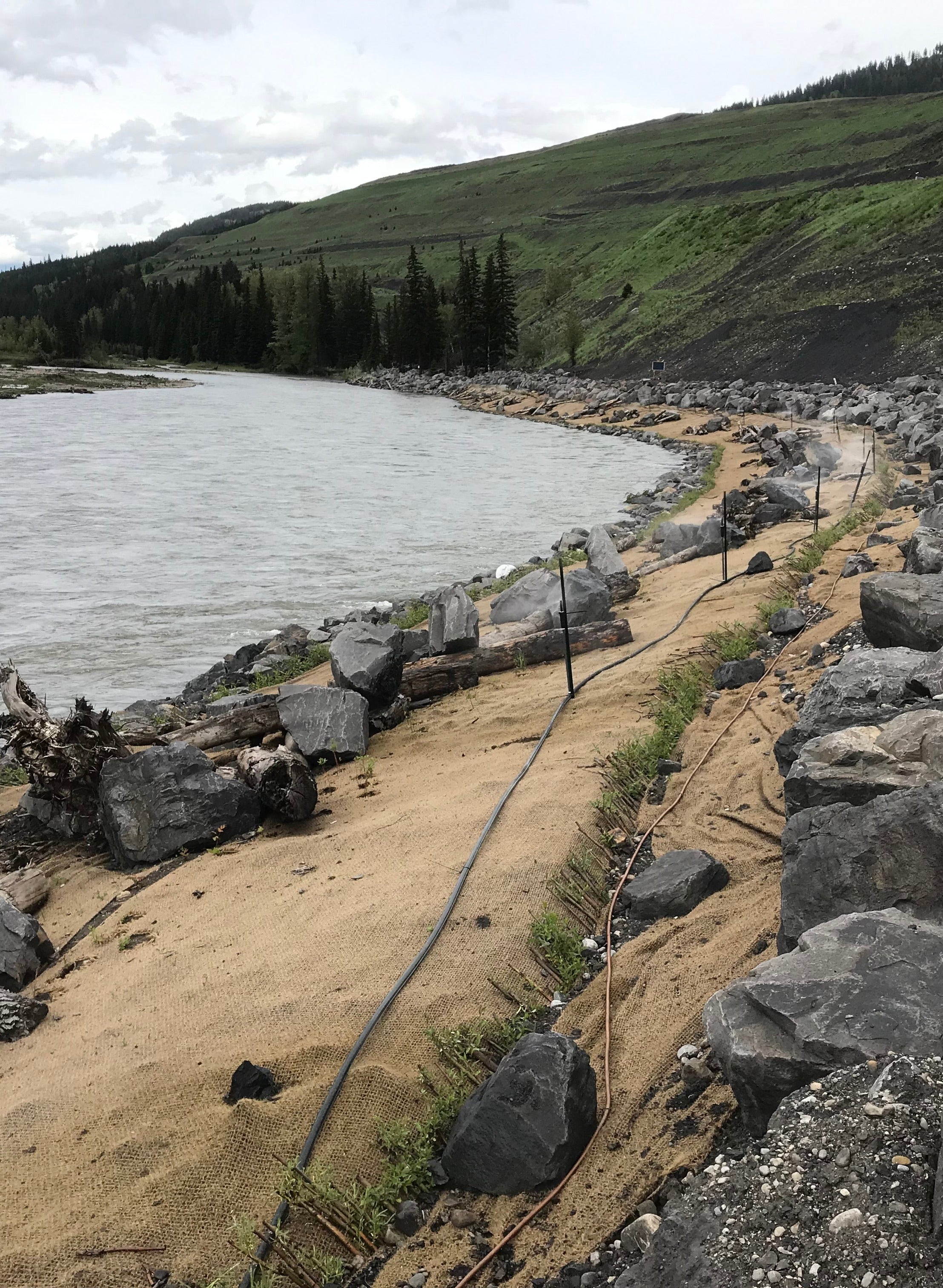
Erosion concerns along the Elk River had the potential to jeopardize the safety of a crucial access road. To mitigate this future risk, we undertook a project that not only stabilized the road but also contributed to enhancing fish habitat, aligned with the objectives of the Department of Fisheries and Oceans (DFO).
Our work encompassed the stabilization of a 1-kilometre stretch of riparian area, achieved through the strategic planting of 14,000 native plants, the placement of riprap, and the construction of log structures to facilitate the creation of fish habitat.
In addition to the initial installation in 2018, our commitment extended to the ongoing maintenance and effectiveness monitoring of the project. This comprehensive approach ensures the long-term stability of the access road while nurturing the ecological balance of the Elk River, underlining our dedication to sustainable solutions and safety enhancement.
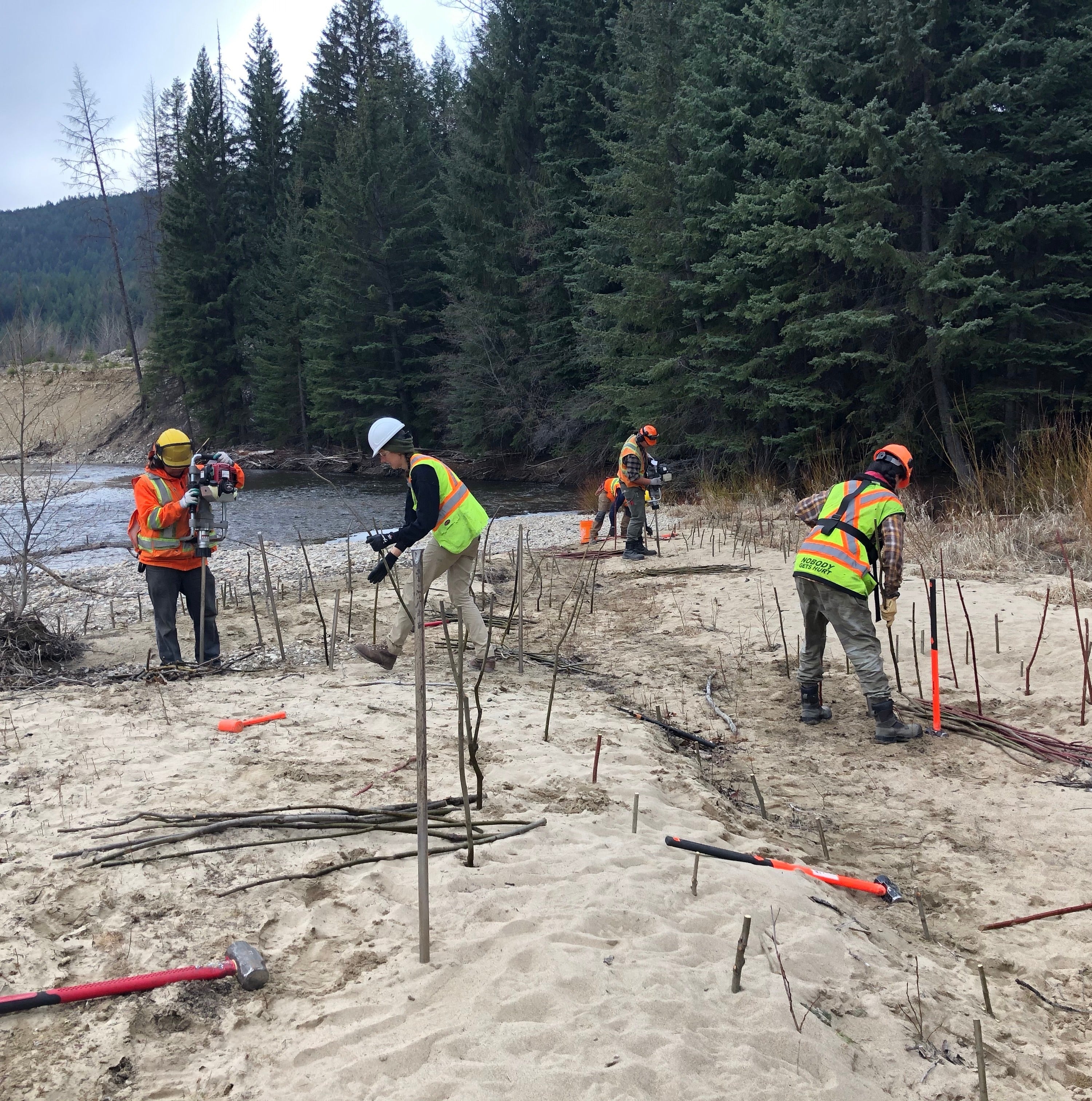
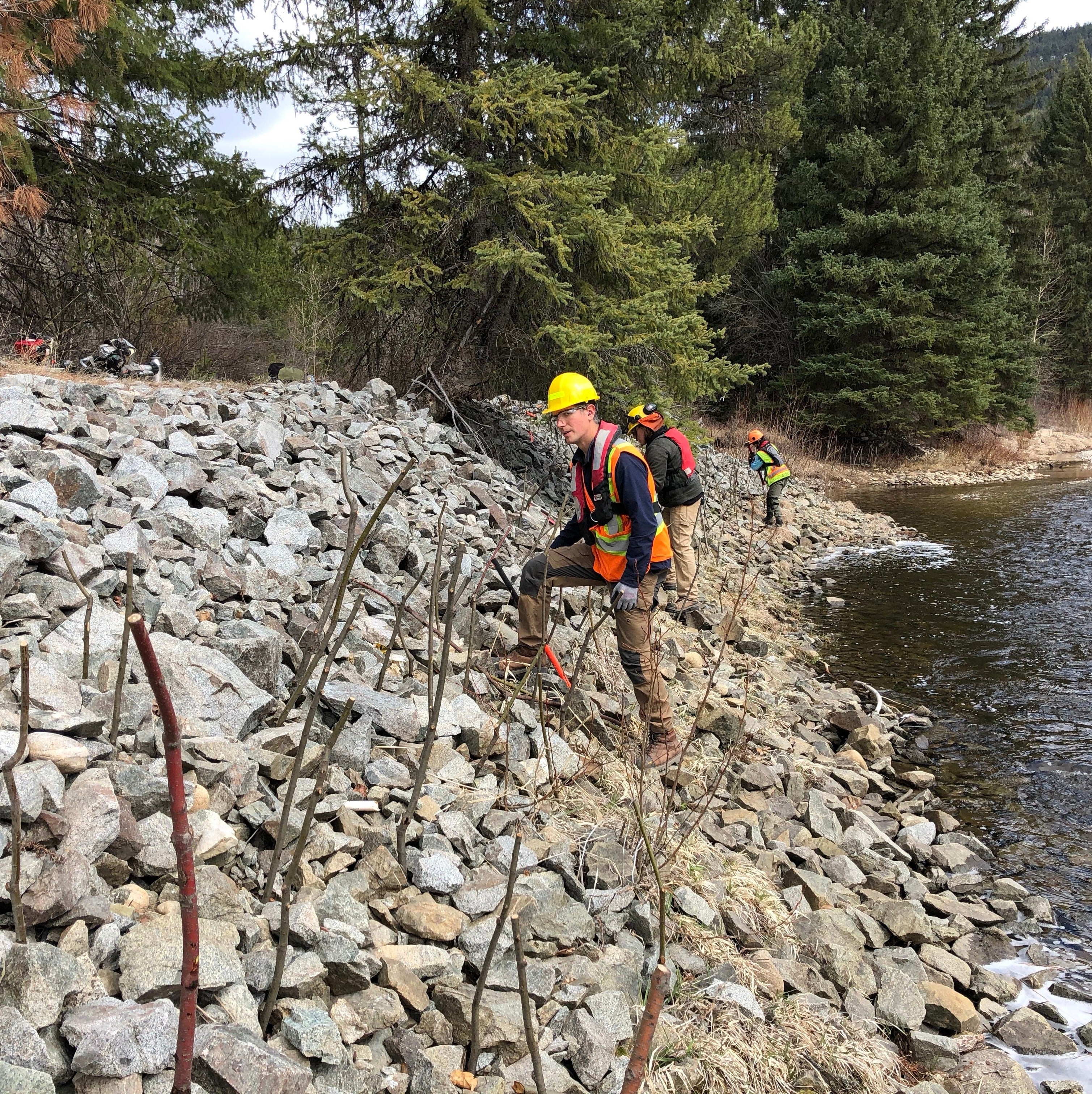
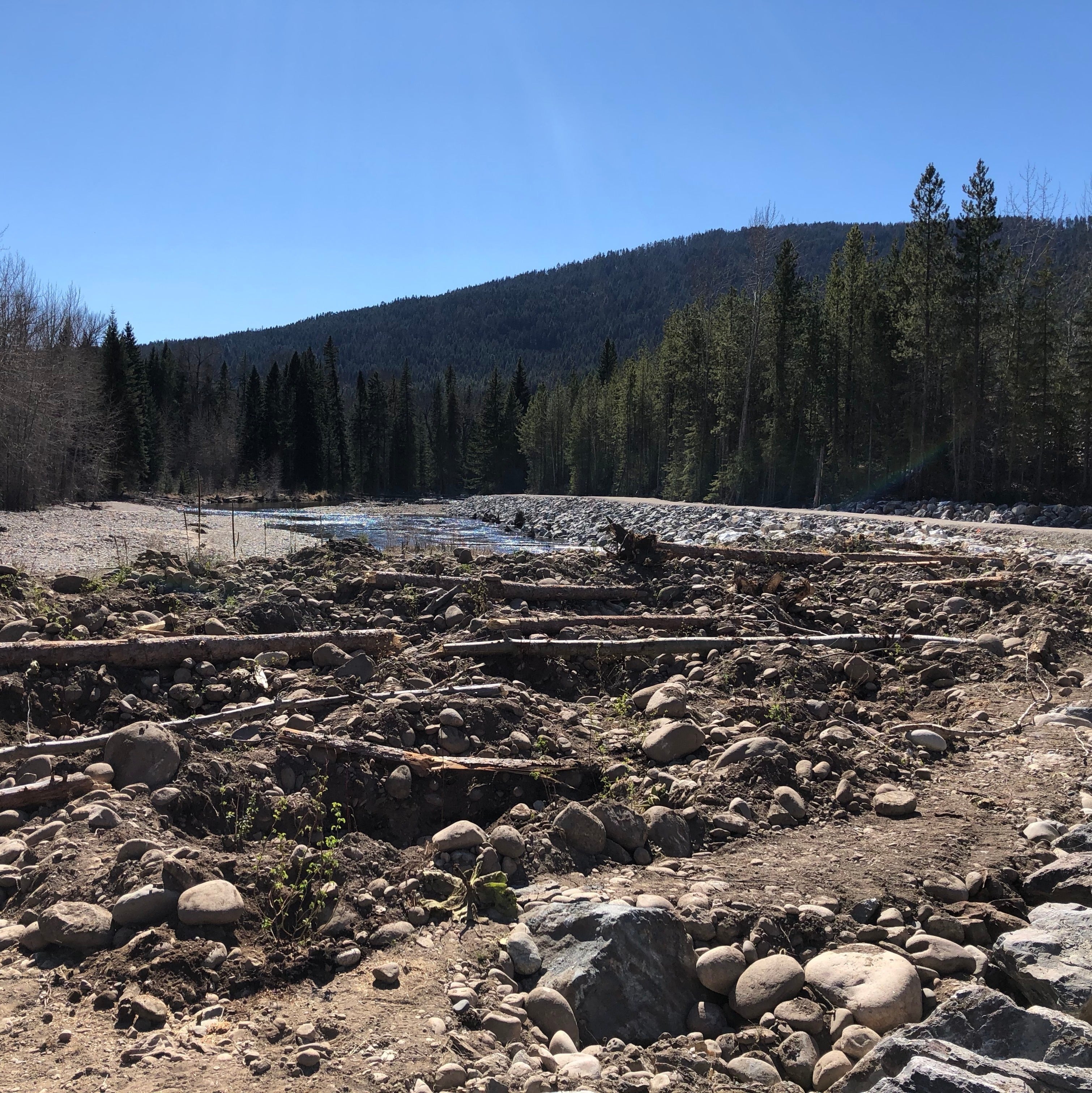
During the closure activities of the Beaverdell mine, a portion of valuable instream and functional riparian habitat was lost. To address this environmental impact, we embarked on a mission to restore and expand the affected areas, resulting in the creation of an additional 2,590 square meters of both instream and riparian habitat.
This multifaceted effort encompassed gravel bar live staking, riparian planting, and trench planting, utilizing live stakes and native container plants to enhance riprap, rough, and loose features along the water's edge. Additionally, habitat logs were thoughtfully installed to further support the revitalization of the ecosystem.
Our commitment extended beyond the initial project installation in 2021, as we've been actively engaged in a comprehensive program of remote solar irrigation, ongoing maintenance, diligent weeding, and effectiveness monitoring, ensuring the continued success and sustainability of the restoration efforts until Fall 2024. In a parallel initiative, we also designed and hosted a two-day Bioengineering and Ecological Restoration workshop, tailored to the needs of the Penticton Indian Band DFO offsetting project, exemplifying our dedication to knowledge sharing and environmental stewardship.
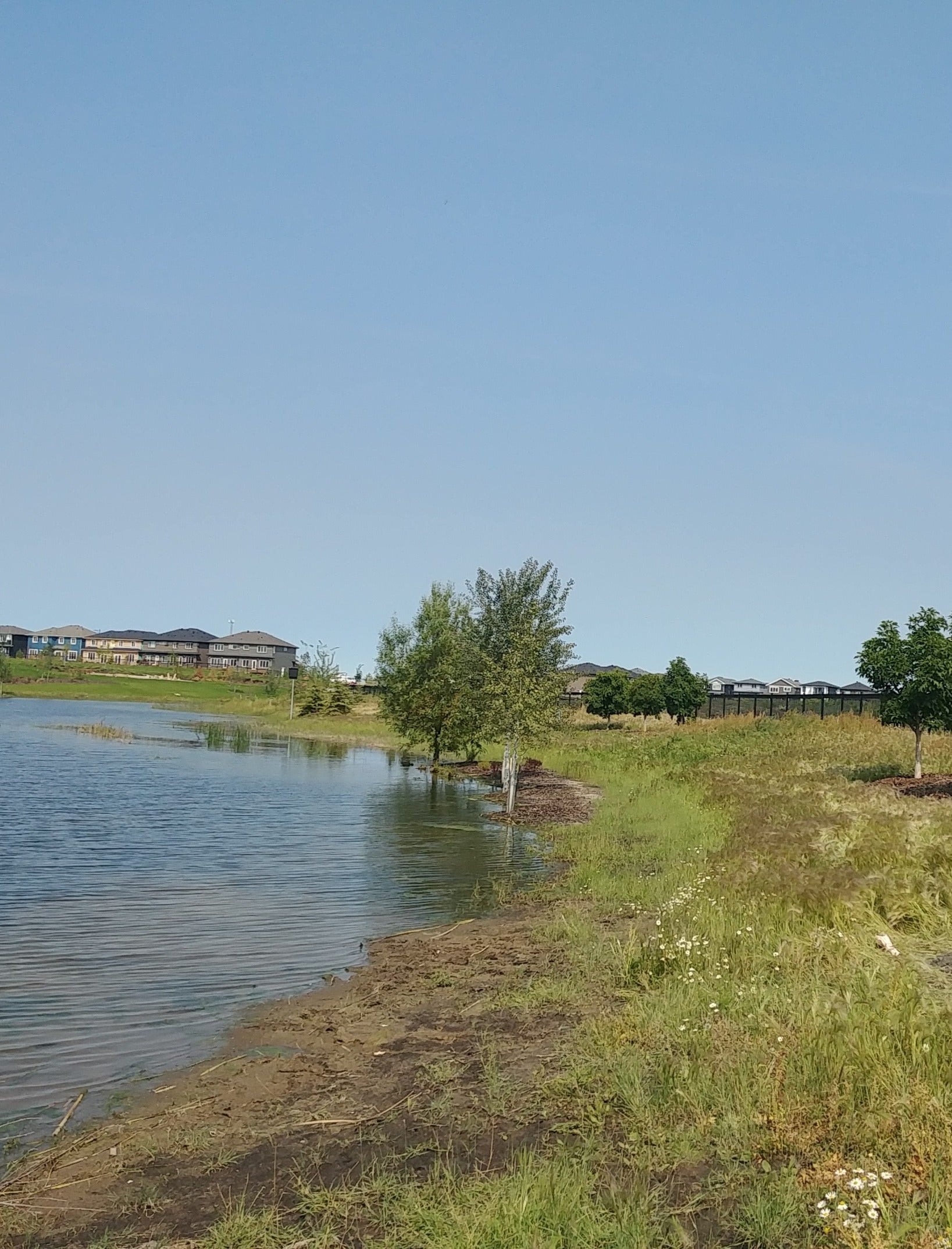
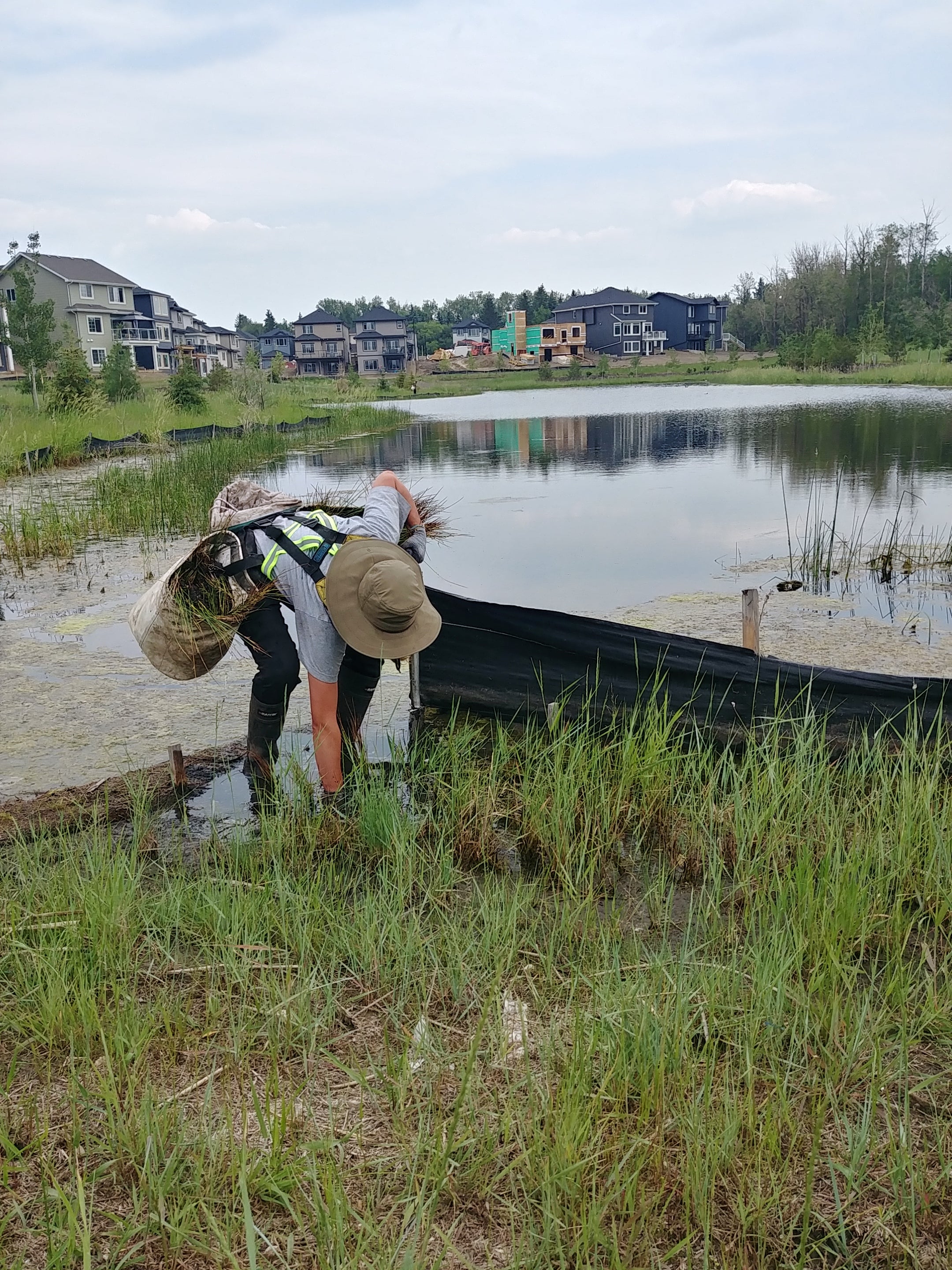
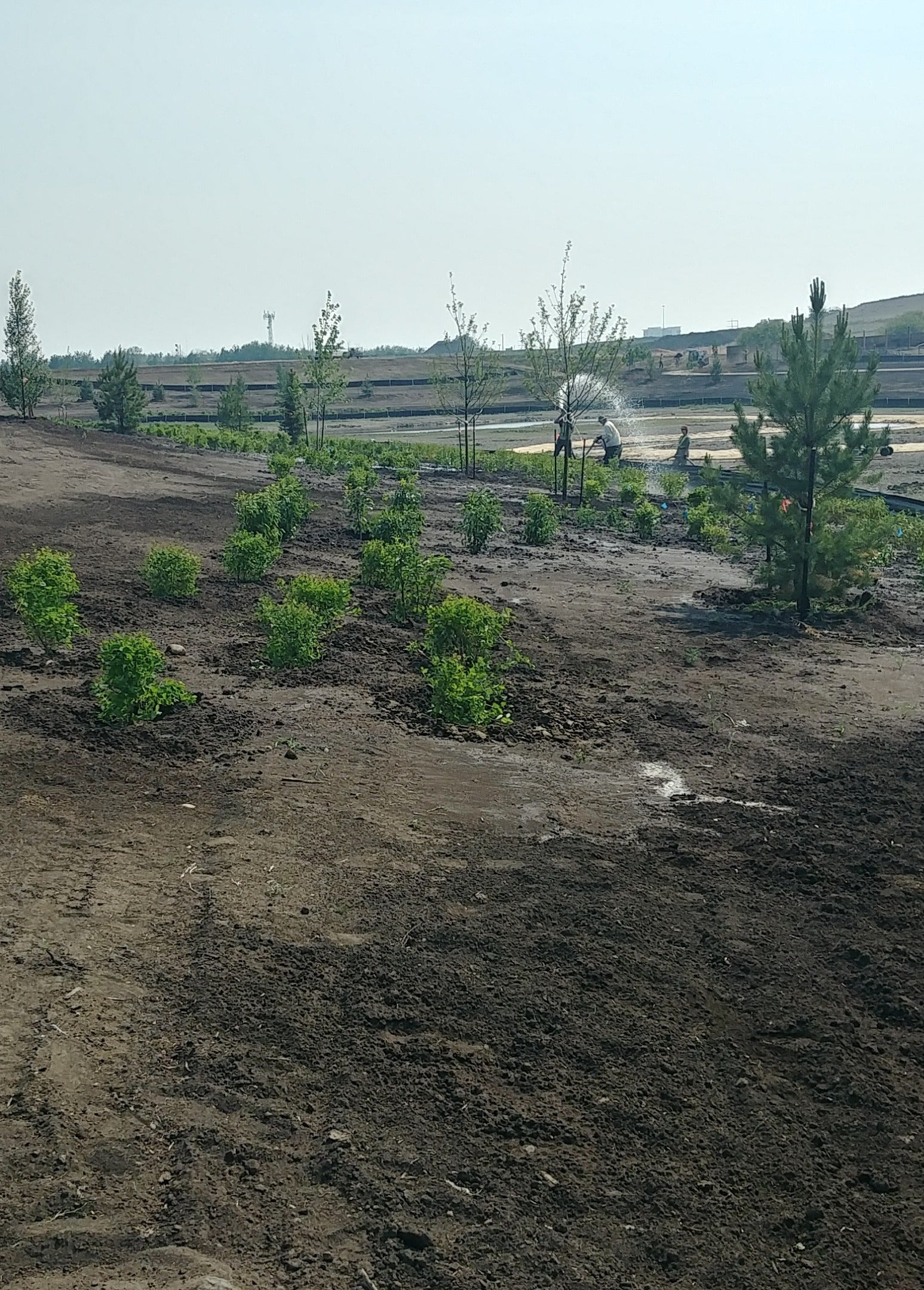
Leaf Ninjas played a pivotal role in the provision and installation of riparian, emergent, and wetland plants for a recently established storm and wastewater pond located just outside Edmonton, Alberta.
This ambitious undertaking involved the meticulous planting of 11,648 native plants, which comprised 6,369 wetland plugs, 1,064 #1-gallon containers, 3,956 #2-gallon containers, and 259 #5-gallon containers.
In addition to the plantings, we also integrated bat boxes into the project, fostering the creation of a habitat to support local wildlife, and underlining our commitment to ecological balance and environmental conservation.
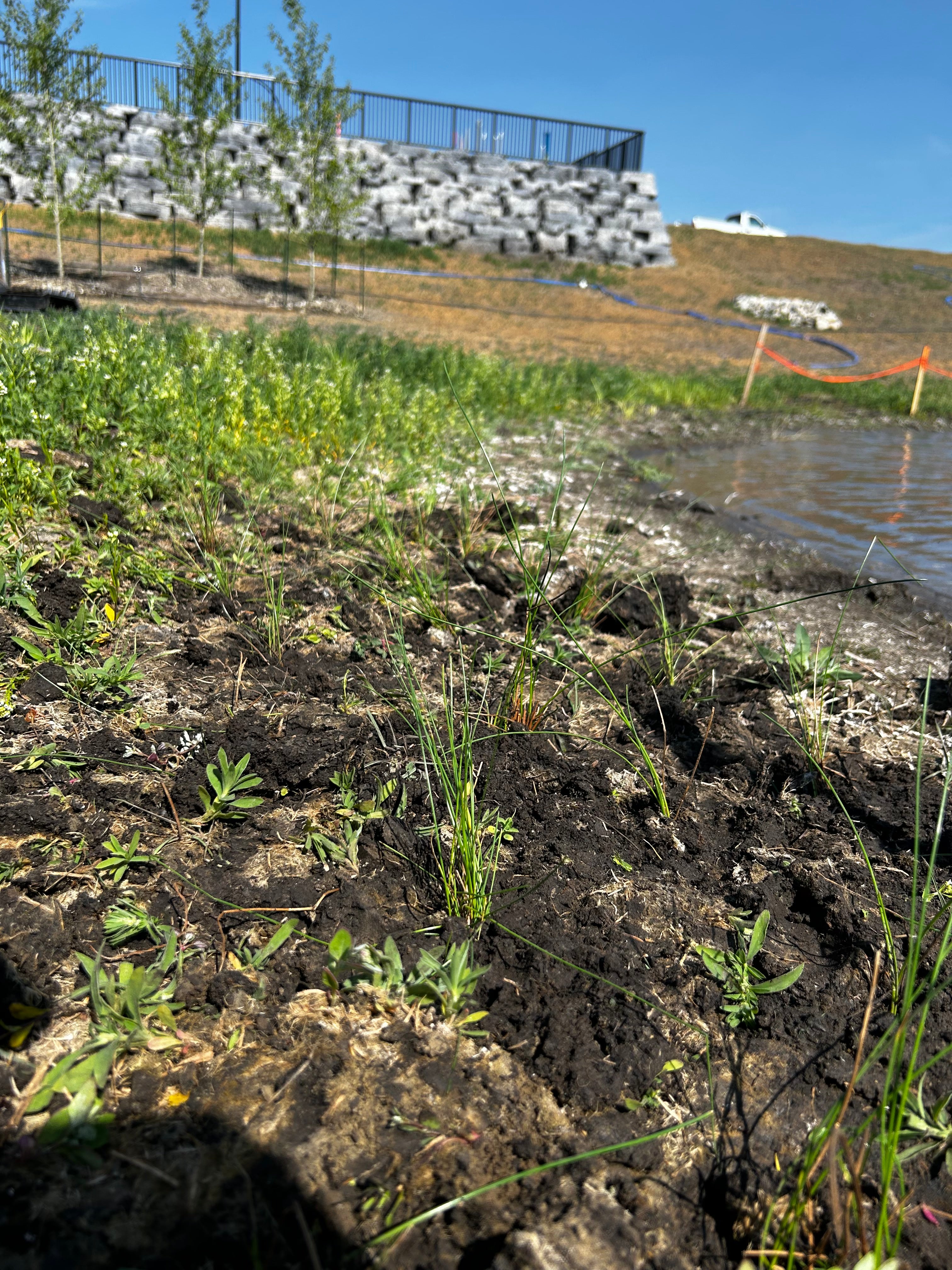
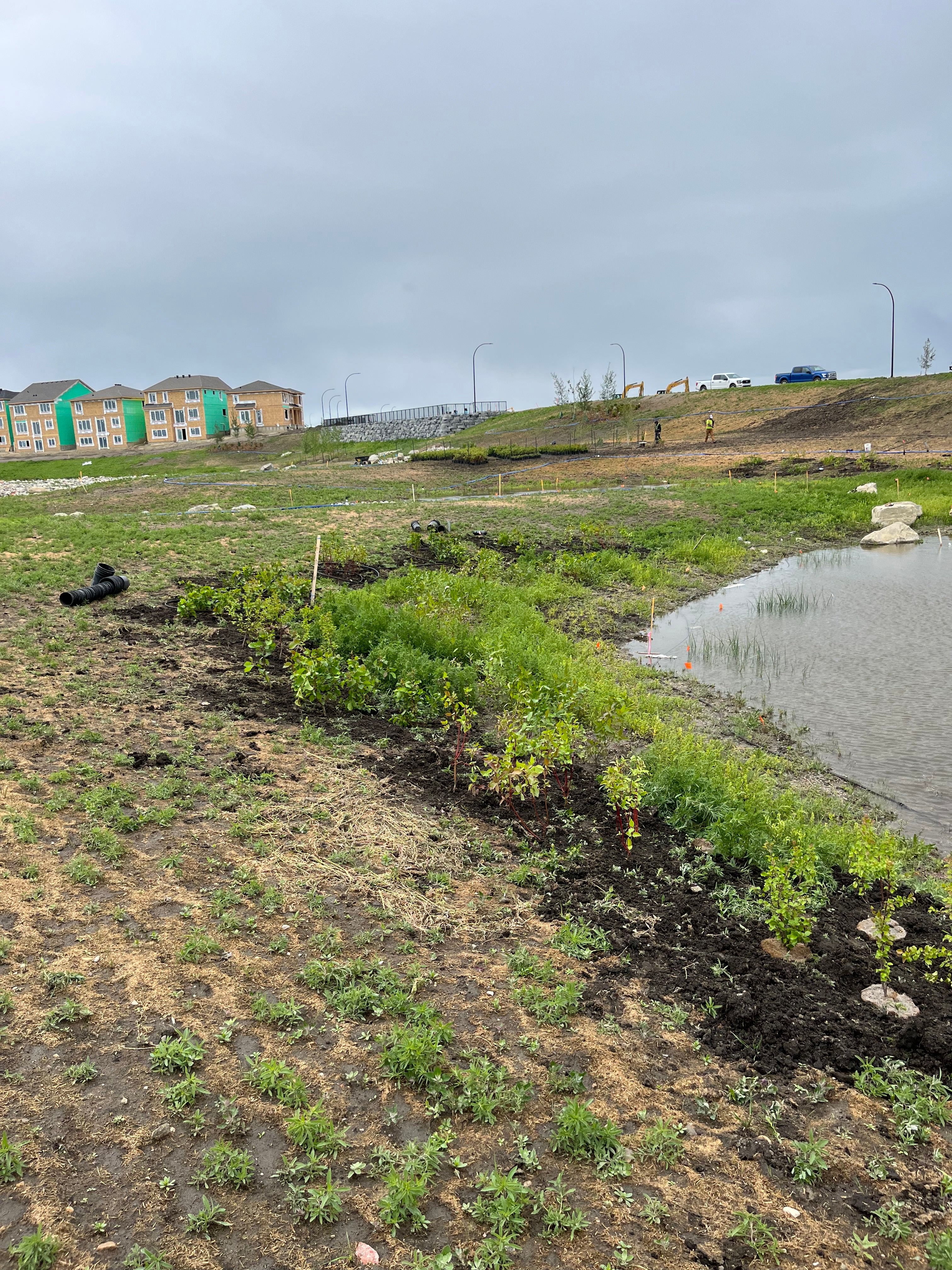
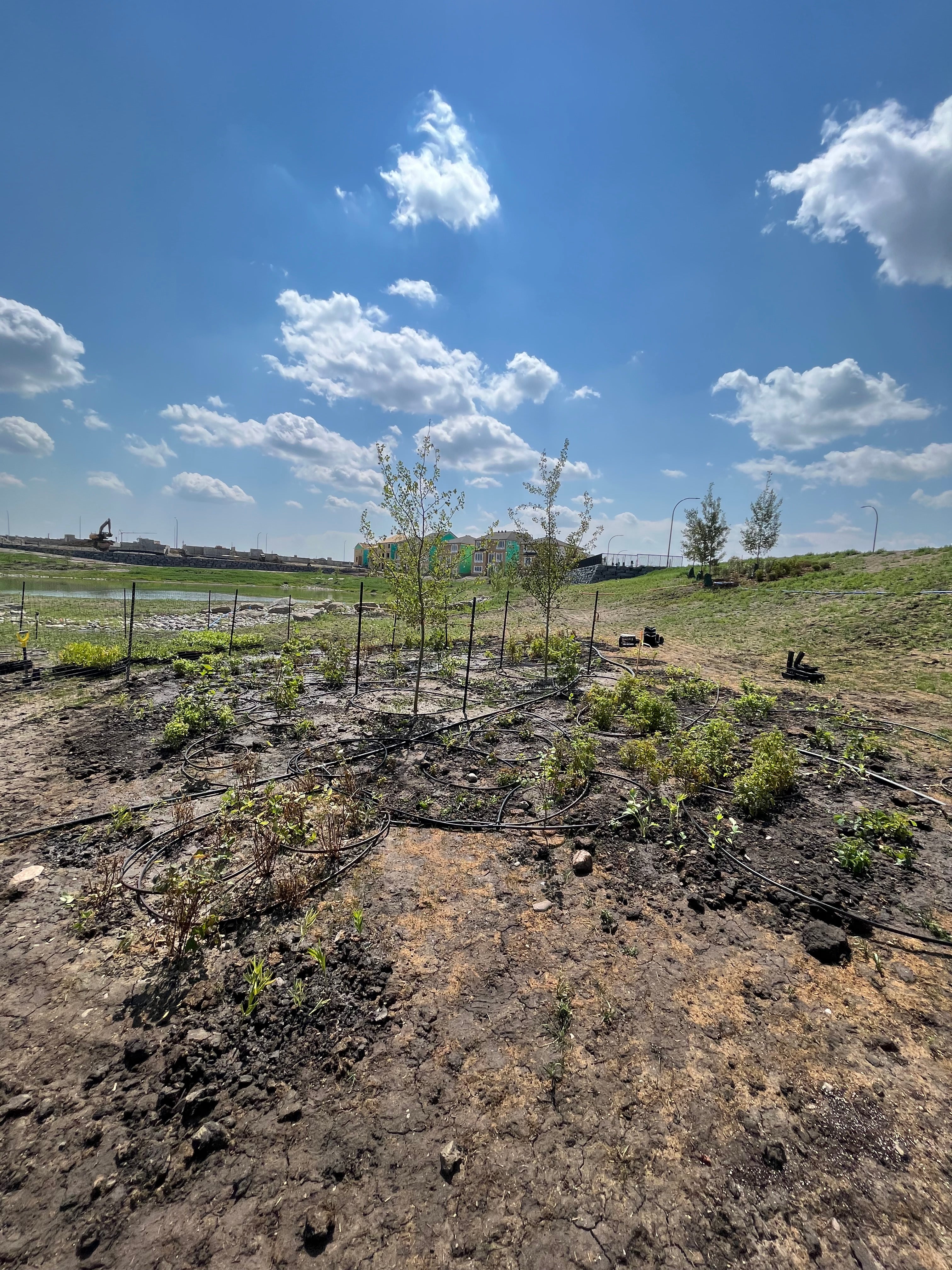
Leaf Ninjas undertook the task of supplying and expertly installing 18,118 native plants within a recently constructed storm pond in the vibrant community of Cityscape, situated in Calgary, Alberta. This substantial planting effort not only enriched the landscape but also played a vital role in enhancing the ecosystem of the area.
Following the successful installation of all 18,000 native plants, our responsibilities extended to providing essential support for the establishment of this newly green environment, encompassing weed control, ongoing maintenance activities, vigilant monitoring, and the implementation of a tailored solar irrigation system.
These collective efforts have contributed to the sustainable and thriving growth of the newly revitalized storm pond, aligning with our commitment to environmental stewardship and the enrichment of the Cityscape community.
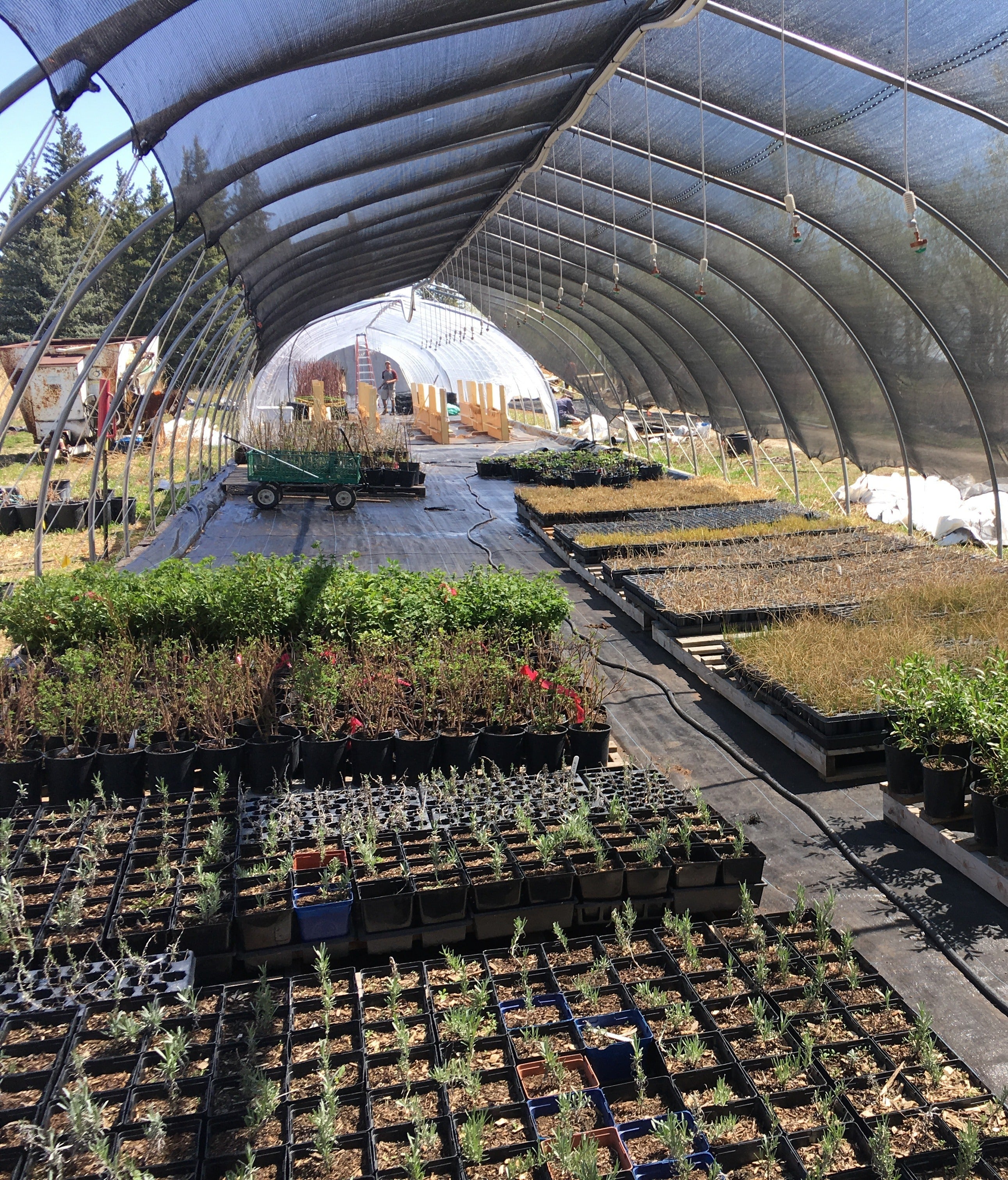
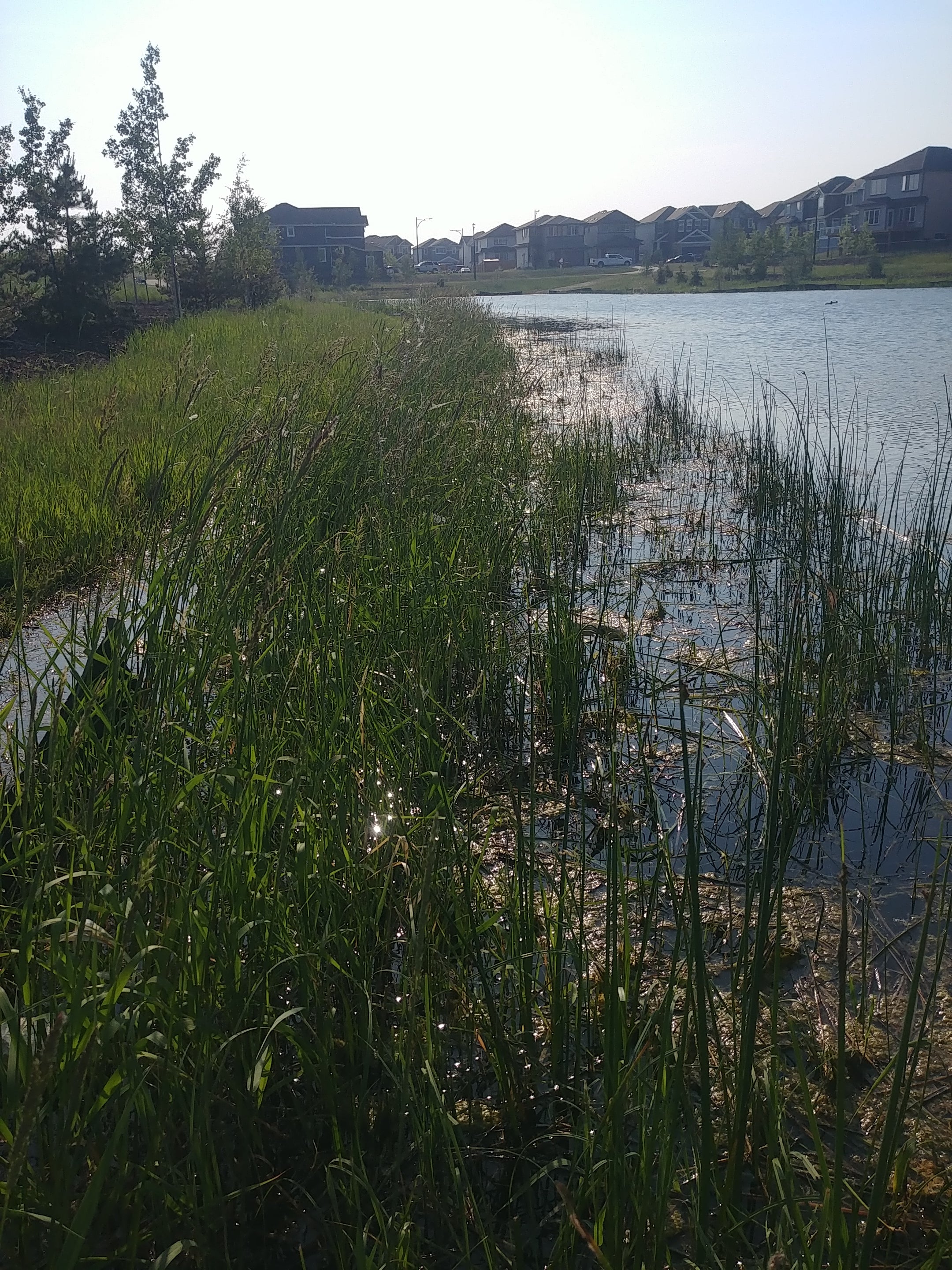
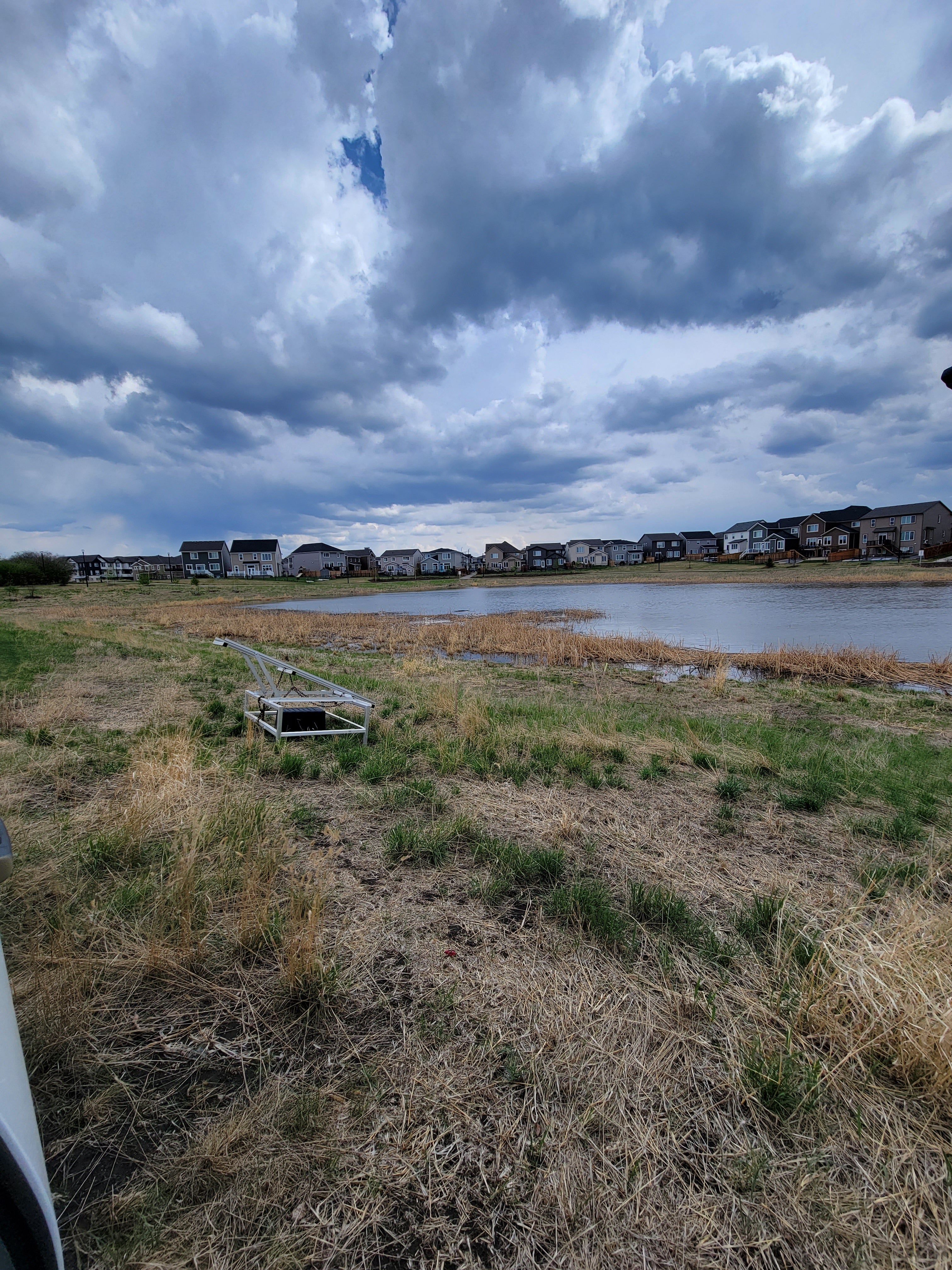
Since 2017, Leaf Ninjas has been actively engaged in multiple phases within the community of Yorkville in Calgary, Alberta, demonstrating a steadfast commitment to environmental conservation and community development. In the Yorkville Wetland project, our scope of work involved a proactive approach to preserve and restore the natural ecosystem. This included pre-disturbance seed collection of wetland species, where native seeds were meticulously harvested from existing species before site preparation to safeguard site genetics threatened by construction activities.
All collected seeds were thoughtfully cultivated at the Leaf Ninjas Nursery and then reintroduced once the storm pond and wetland were reinstalled. Complementing this, our team meticulously planted 9,000 wetland plugs and provided a year of maintenance, waterfowl protection, and establishment support to ensure the successful rejuvenation of the wetland. In the Yorkville Central Park and Aspen Naturalization Grove, we extended our expertise by offering design consultation, encompassing species selection, sizing considerations, project approach, and enhancement strategies.
Subsequently, Leaf Ninjas supplied and installed a remarkable 7,000+ wetland, riparian, and upland plants, implementing solar irrigation systems for sustainable growth. Our ongoing commitment includes comprehensive maintenance, diligent monitoring, and unwavering support for the establishment of these vital green spaces, contributing to the overall environmental health and beauty of the Yorkville community.
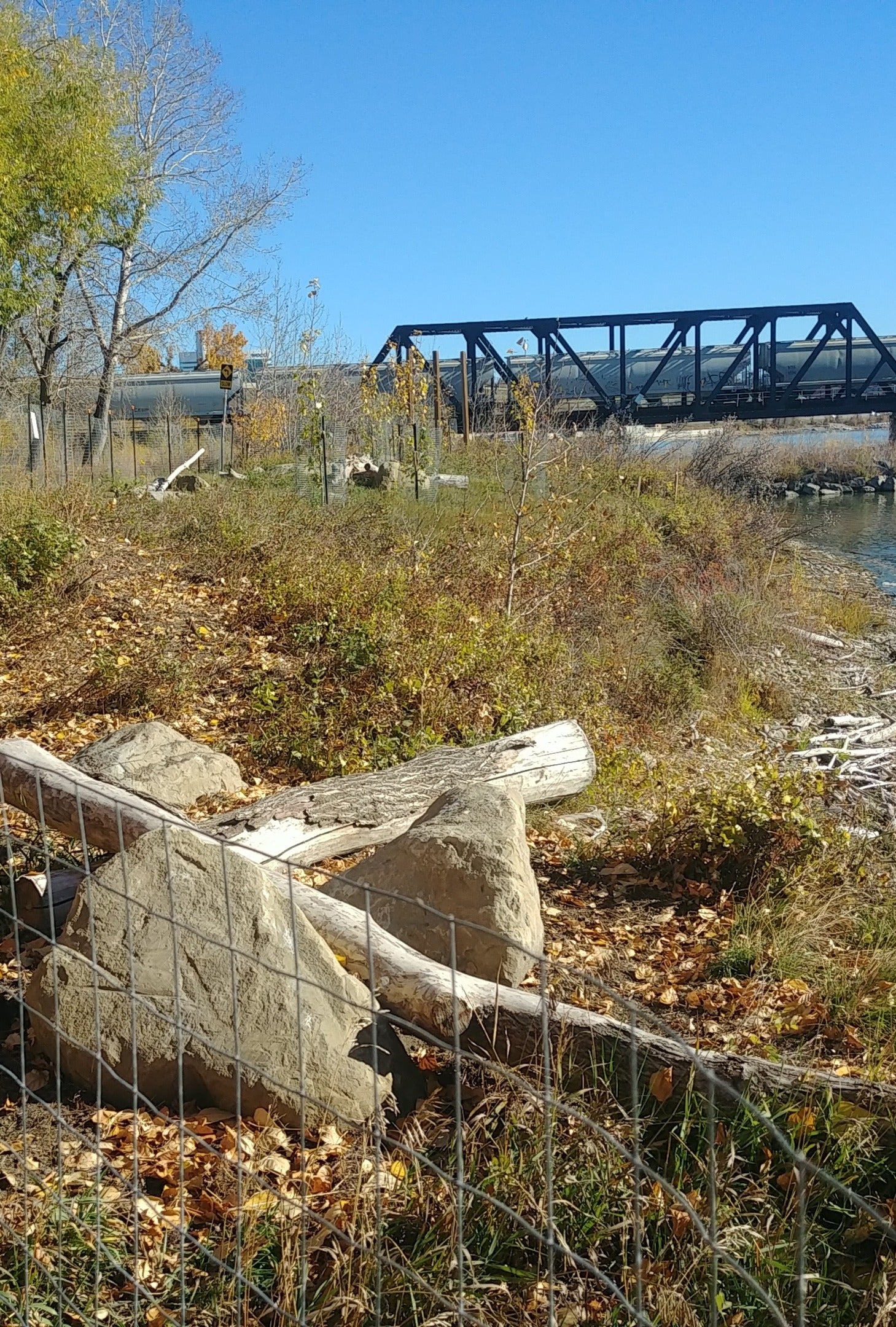
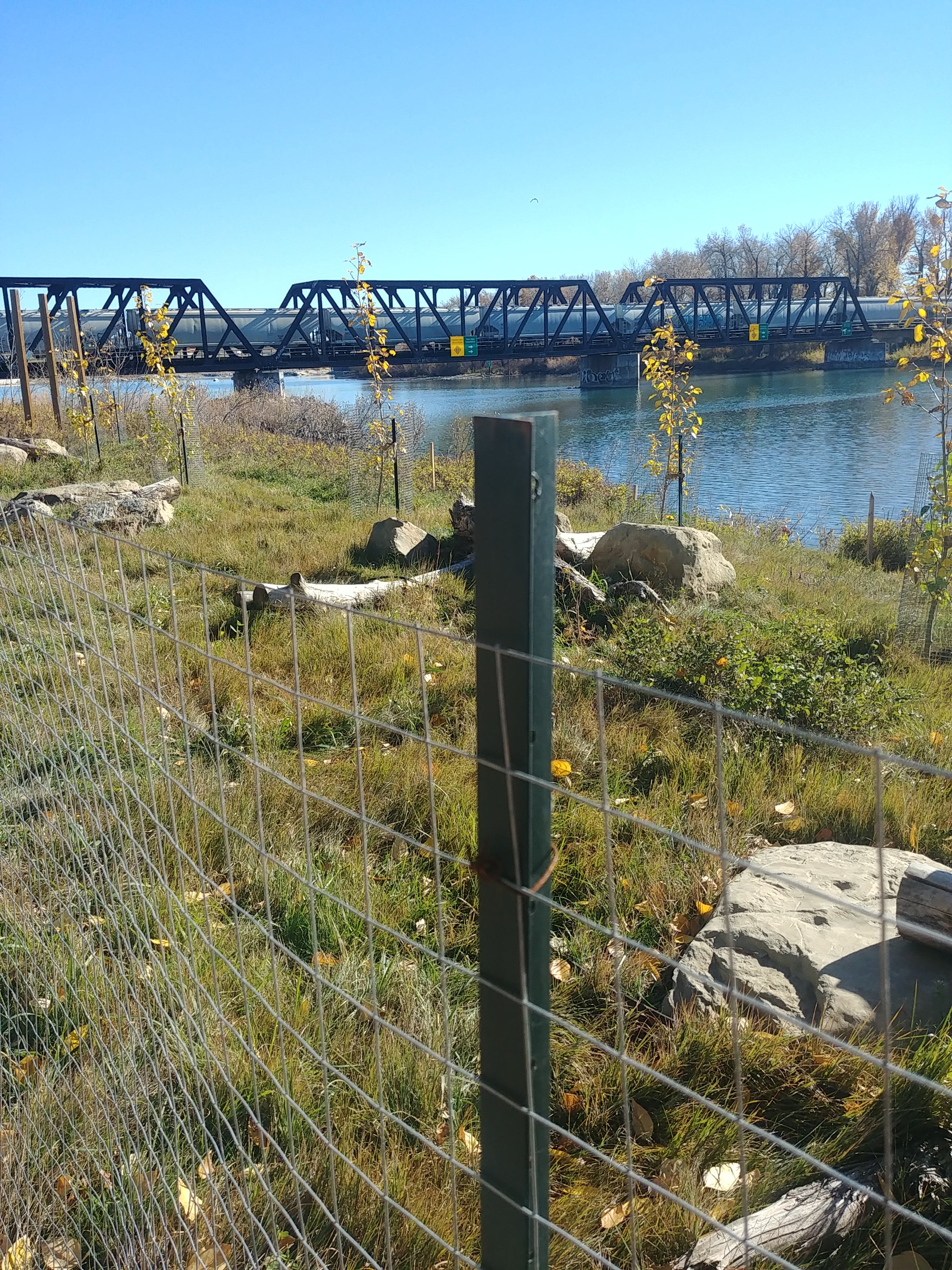
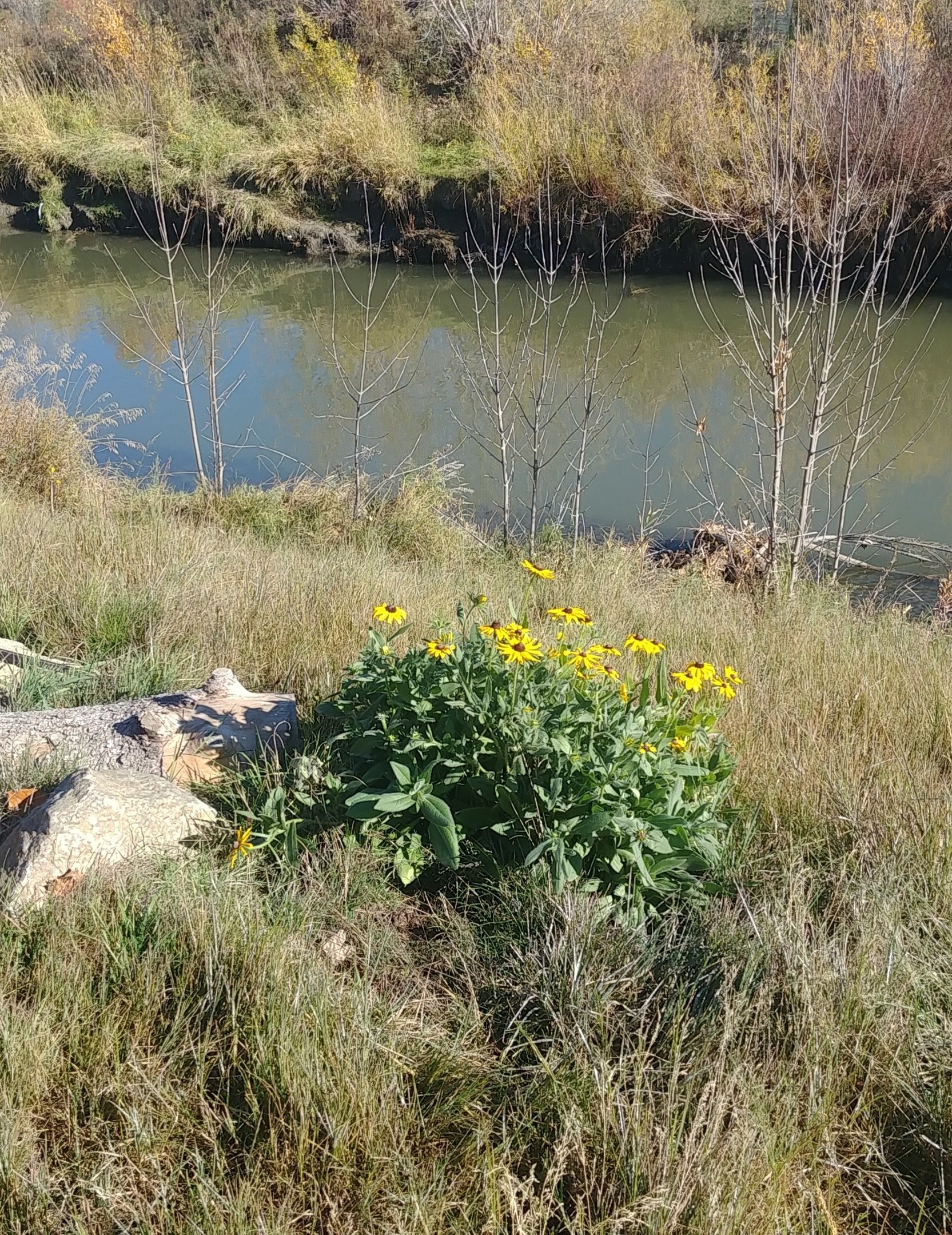
Initiated as a Department of Fisheries and Oceans (DFO) offsetting project to mitigate the environmental impact of other works within the city, this endeavor focused on the restoration of both the East and West sides of Nose Creek. These areas were afflicted by severe erosion, devoid of essential vegetation and fish habitat, and plagued by an overgrowth of invasive plant species. Leaf Ninjas undertook a comprehensive effort to rejuvenate the natural landscape, commencing with the installation of over 1,000 native shrubs and trees, creating a vibrant and sustainable ecosystem.
The project also featured the establishment of pollinator habitat, the installation of duck boxes, and the innovative implementation of 'Nature's Turf.' As part of the restoration, we excavated and replaced 250 cubic meters of soil to provide an optimal foundation for growth.
Furthermore, we have committed to a four-year plan of invasive weed control, ongoing maintenance, vigilant monitoring, and the application of solar irrigation to support the continued flourishing of this vital ecological habitat. This project exemplifies our dedication to environmental preservation and the enhancement of natural habitats within our community.
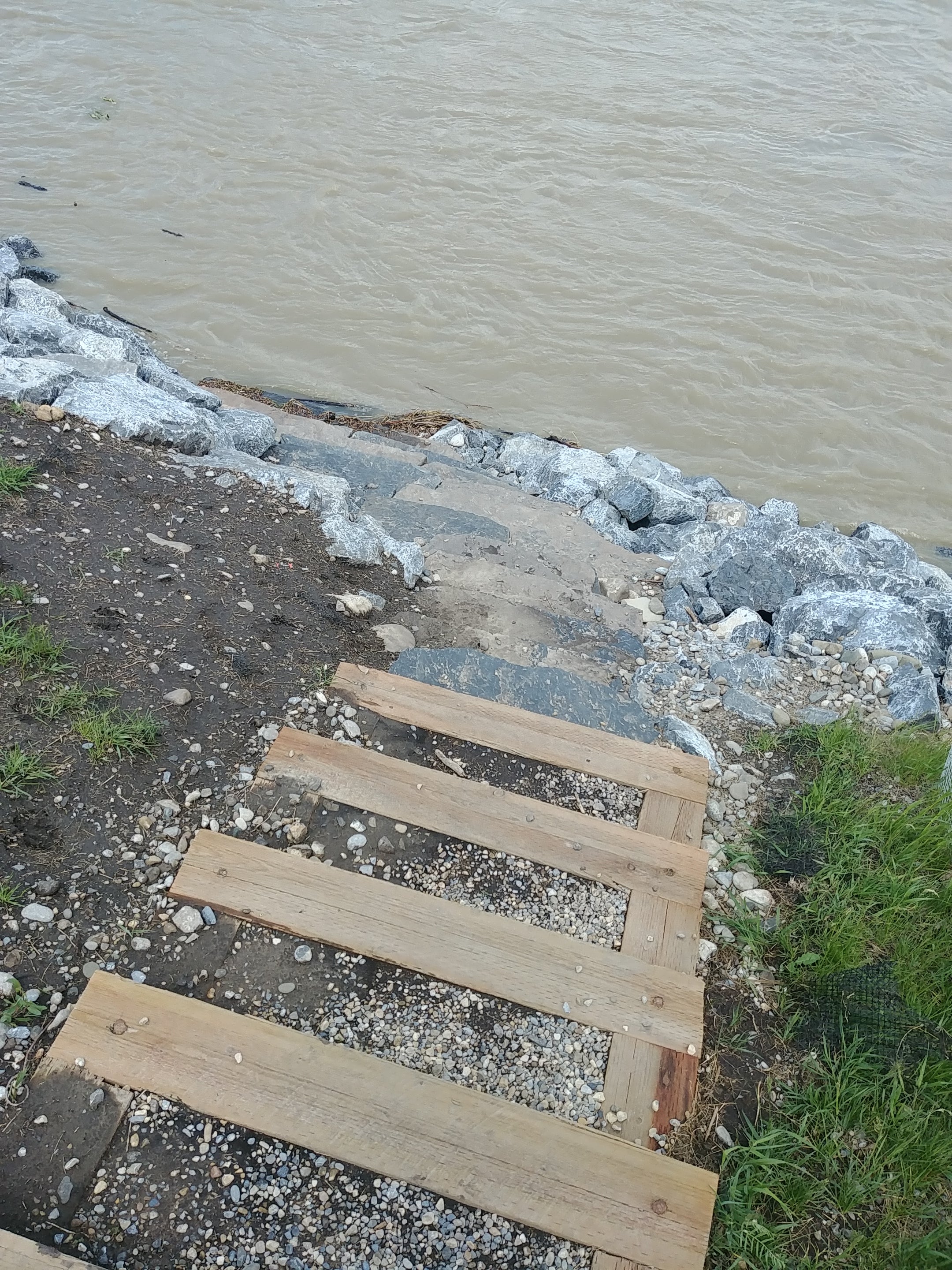
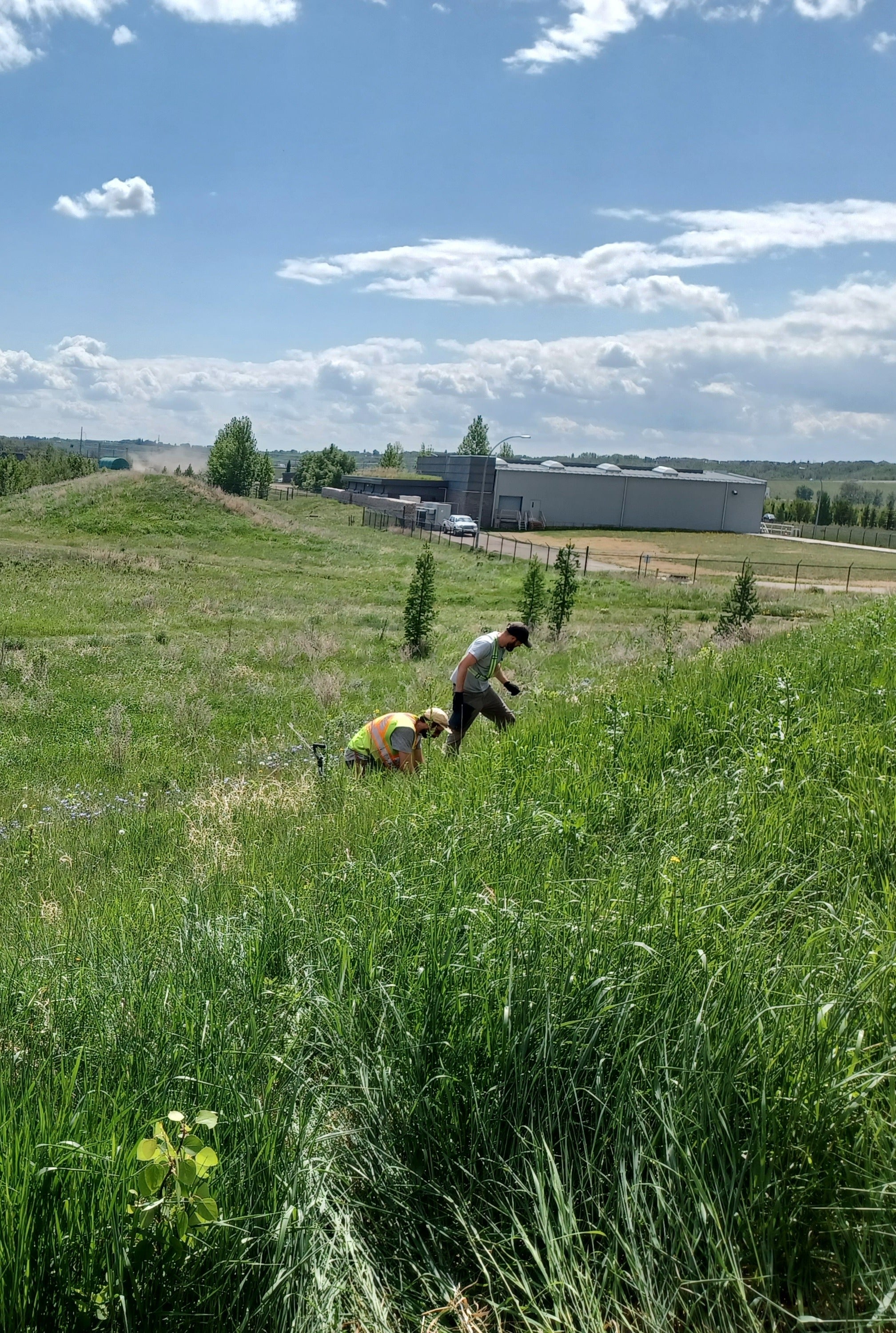
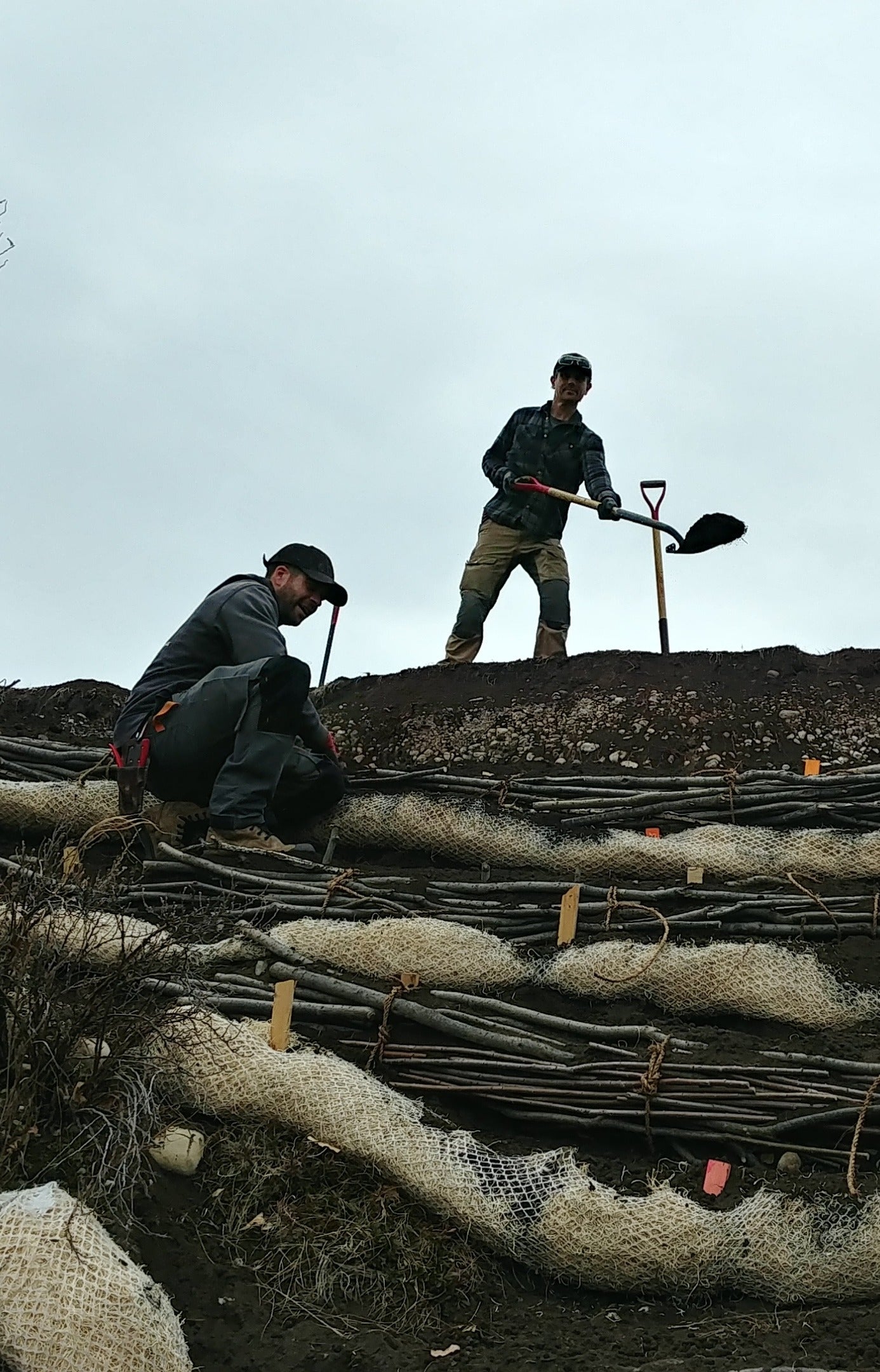
Leaf Ninjas embarked on an extensive ecological restoration project spanning 25 hectares within the pristine natural area along the Bow River, aimed at fortifying and vegetating the delicate riparian environment. Our multifaceted approach included the installation of 14,000 native plants, thoughtfully distributed across various polygons within the park, further enhancing biodiversity and promoting ecosystem health. Additionally, we undertook the design and installation of a bank failure mitigation system utilizing pre-rooted live stakes, a pioneering off-season bioengineering element.
Invasive and noxious weed control measures were diligently applied to safeguard the integrity of the revitalized area. The project also featured the supply and installation of Dirt Bags, a practical solution for erosion control. Further contributing to the restoration, we seeded a substantial 18,500 square meters with native species, promoting sustainable vegetation growth.
To facilitate user access and enjoyment of the picturesque Bow River, we meticulously installed riprap and stone boulder steps. Ensuring the long-term success of the project, we committed to three years of solar irrigation, ongoing maintenance, systematic monitoring, and comprehensive reporting, reinforcing our dedication to ecological preservation and community engagement.
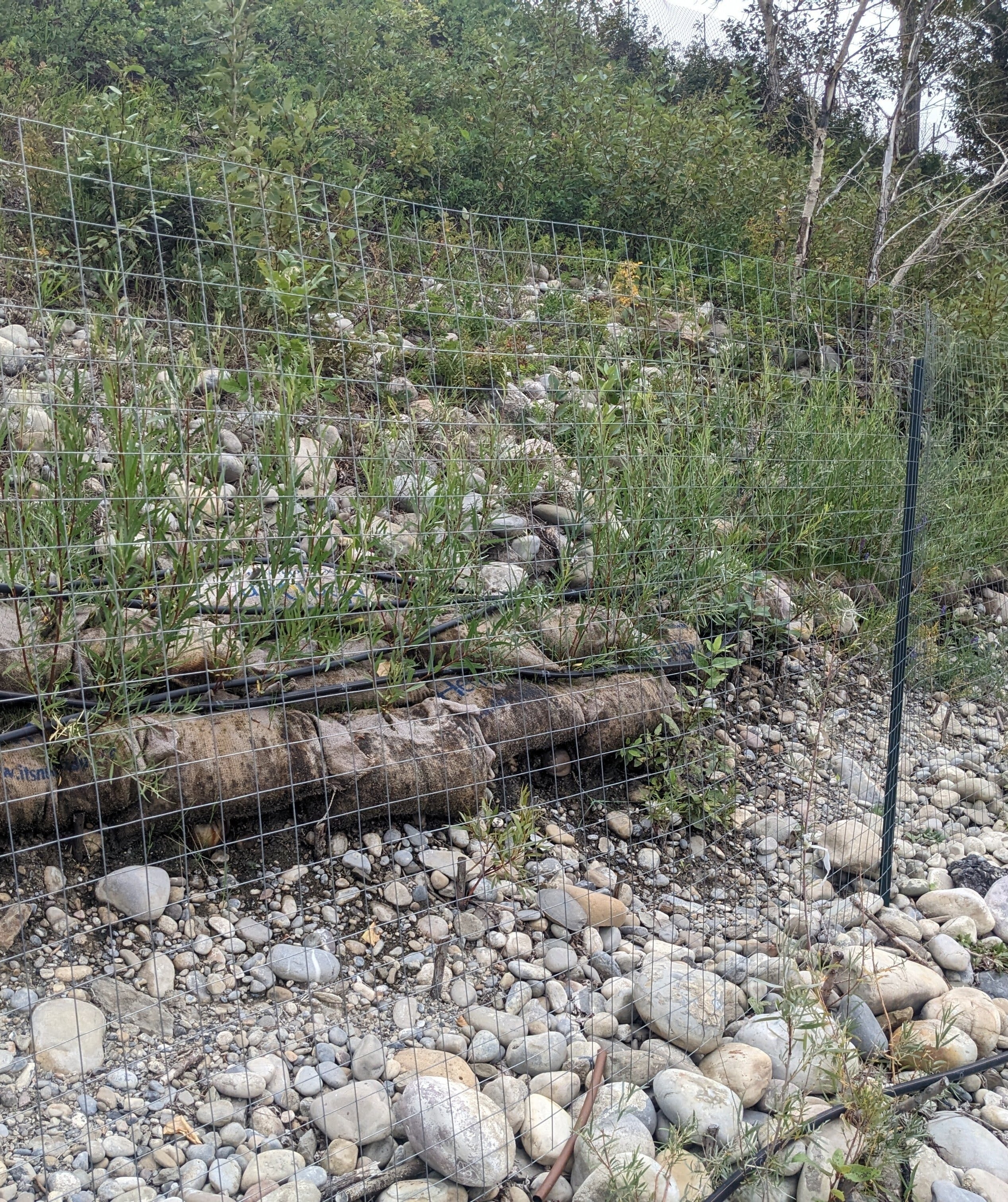
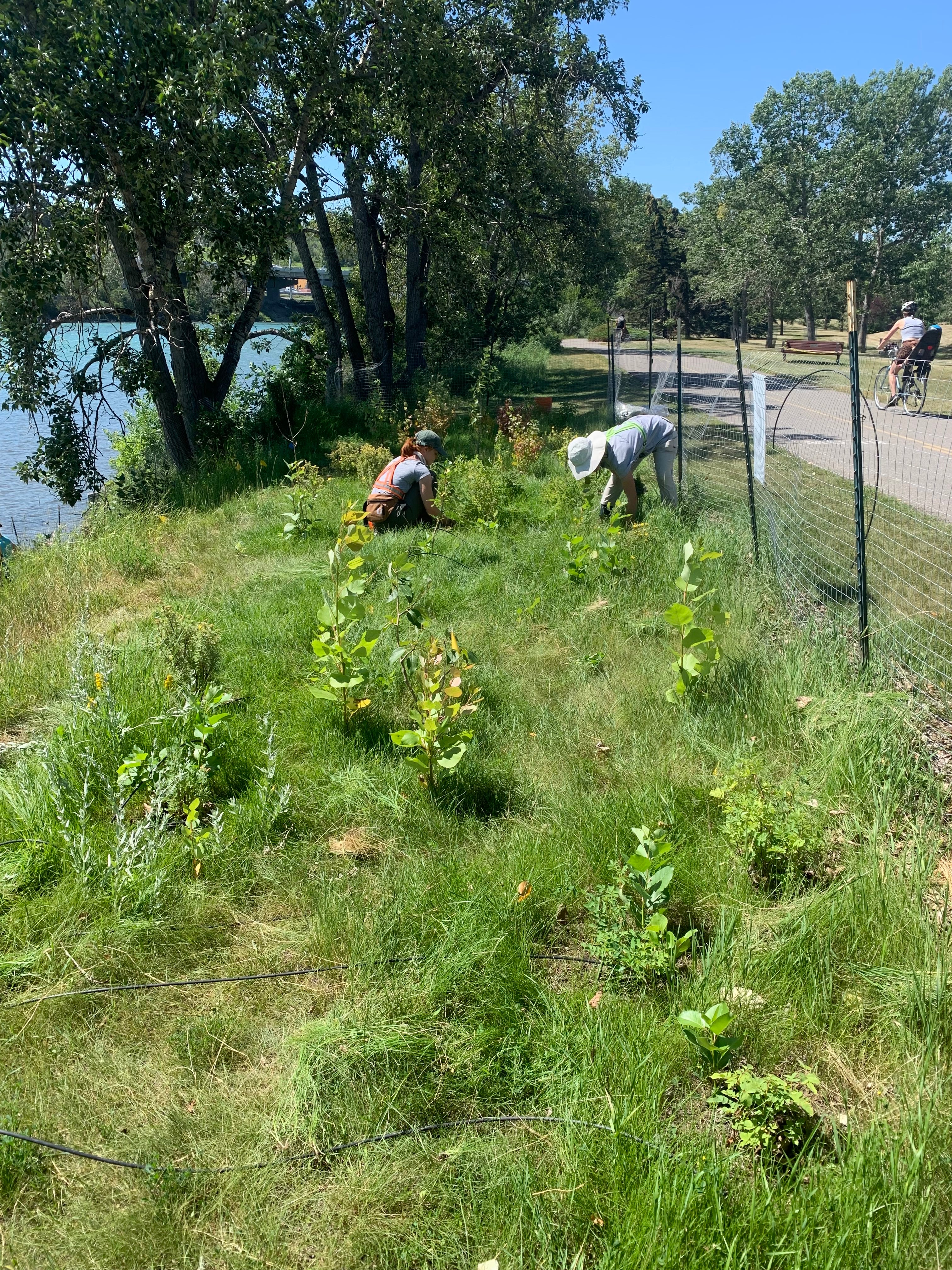
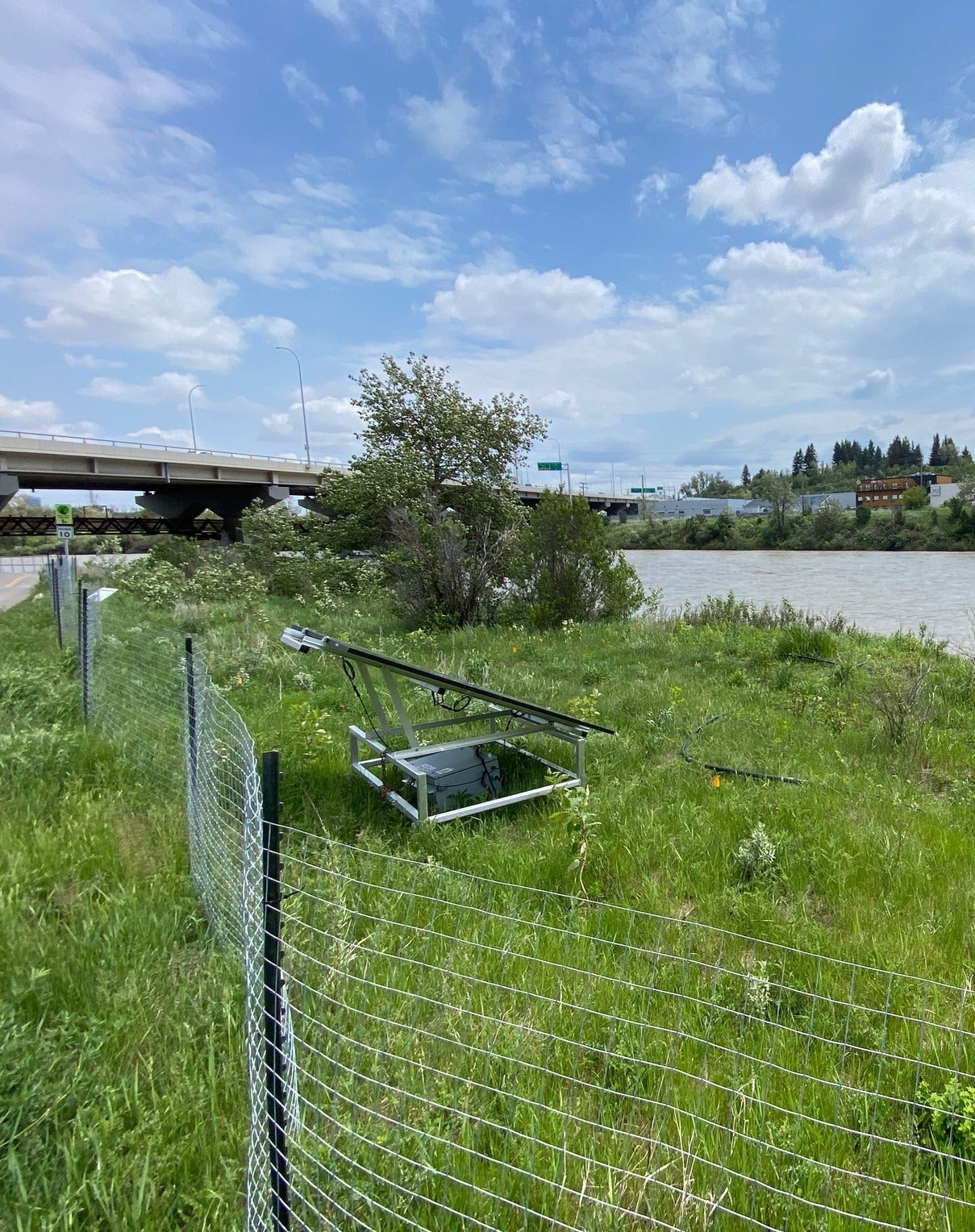
Leaf Ninjas spearheaded a vital ecological initiative centred on the installation of 15,000 native plants along the Bow River, serving a dual purpose of enhancing fish habitat and stabilizing the riverbank within the Bow River region pathway. As part of our commitment to community and corporate engagement, we also orchestrated a successful corporate tree-planting day, fostering a sense of shared responsibility for the environment.
The project further integrated the creation of a dedicated pollinator habitat section, thoughtfully incorporating large woody debris and a seasonally blooming area to support local wildlife and promote biodiversity. Herbivory and exclusion fencing measures were employed to protect the newly planted vegetation. Leveraging custom Leaf Ninjas seeding pellet solutions, DirtBag installations, and innovative design-build approaches, we optimized the project's sustainability and success.
To ensure the long-term health and growth of the newly established habitat, we implemented a comprehensive plan consisting of three years of solar irrigation, ongoing maintenance, diligent monitoring, and rigorous invasive and noxious weed control. This project embodies our unwavering commitment to ecological preservation and the creation of thriving natural spaces within the Bow River region.
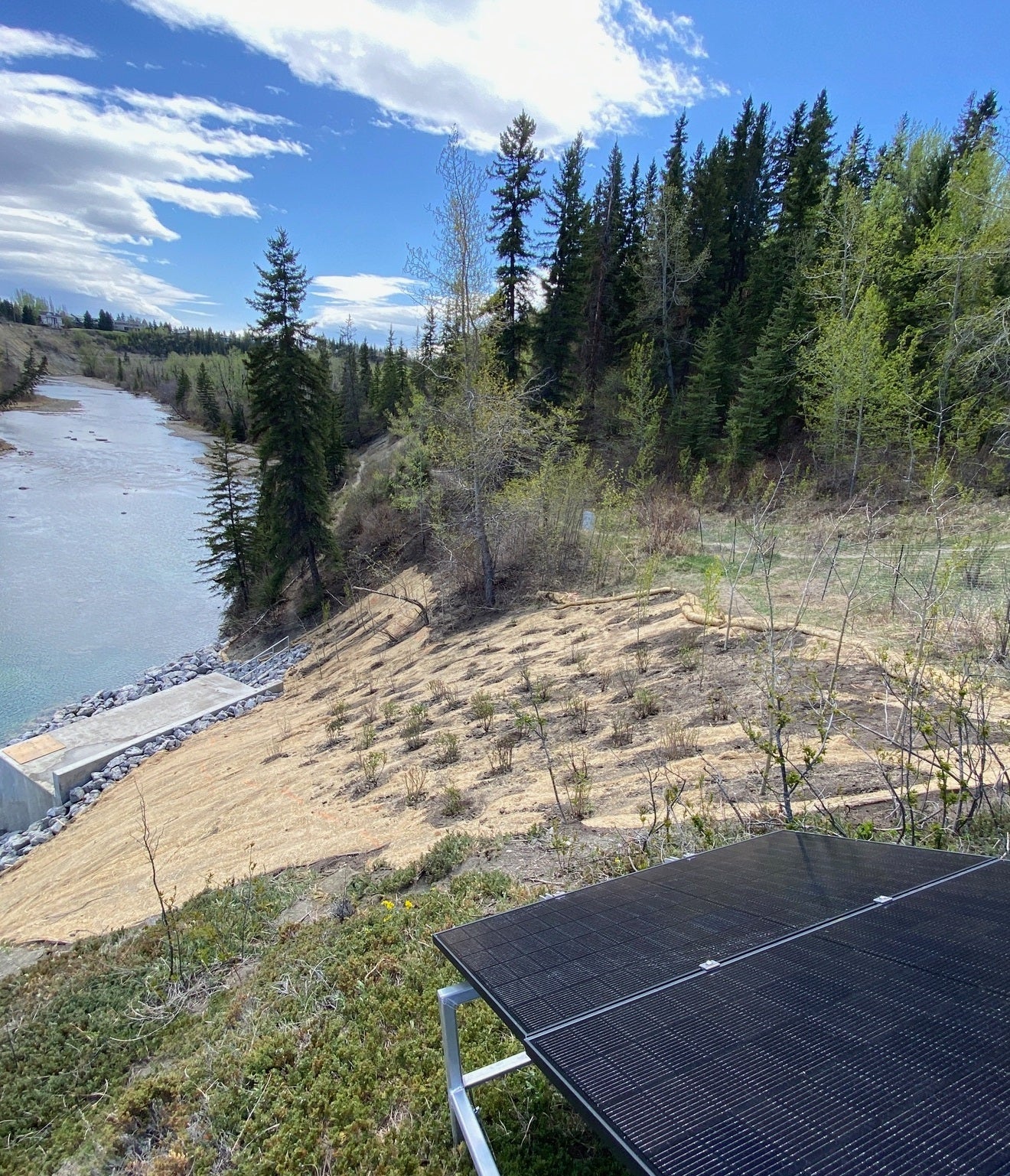
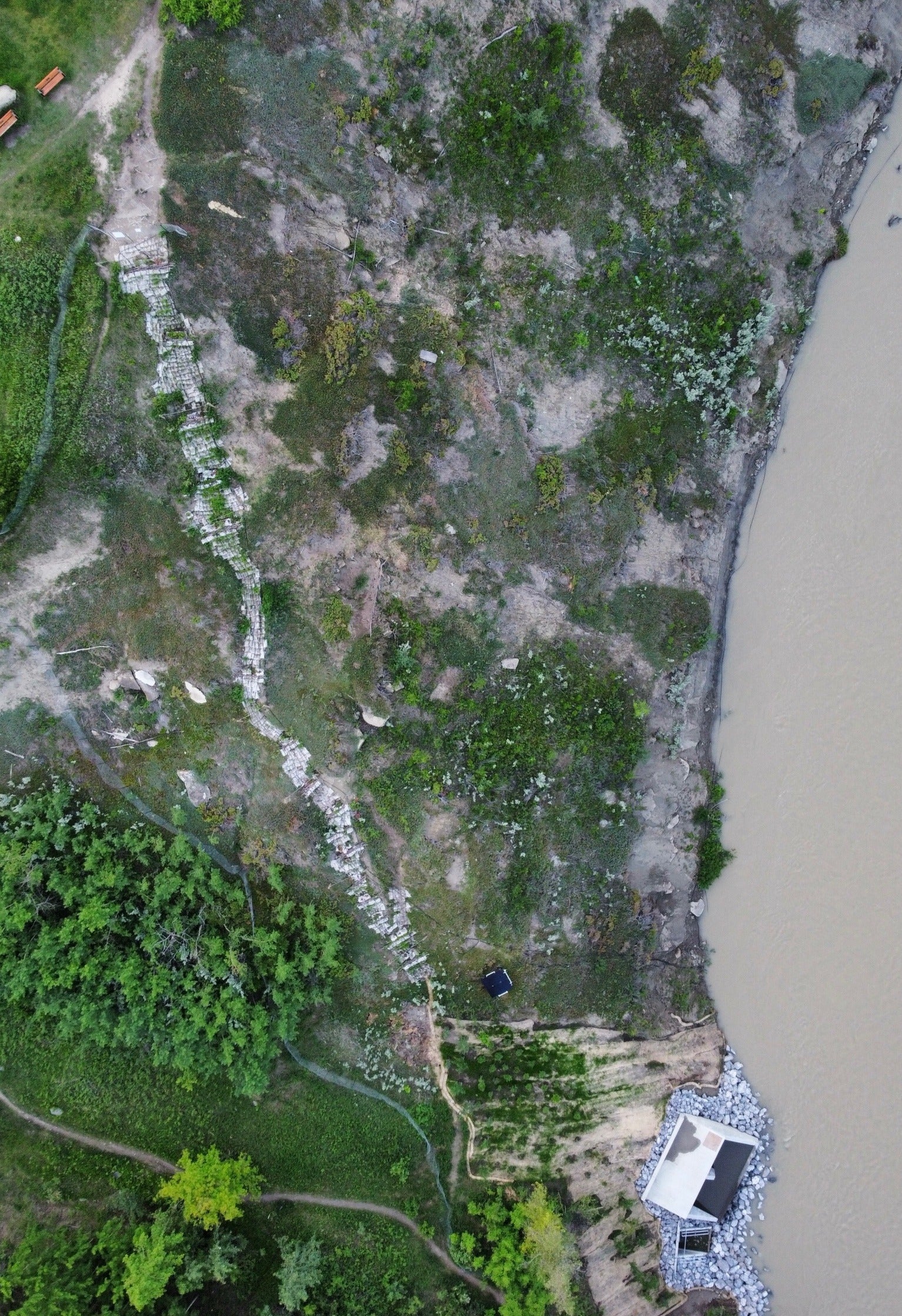
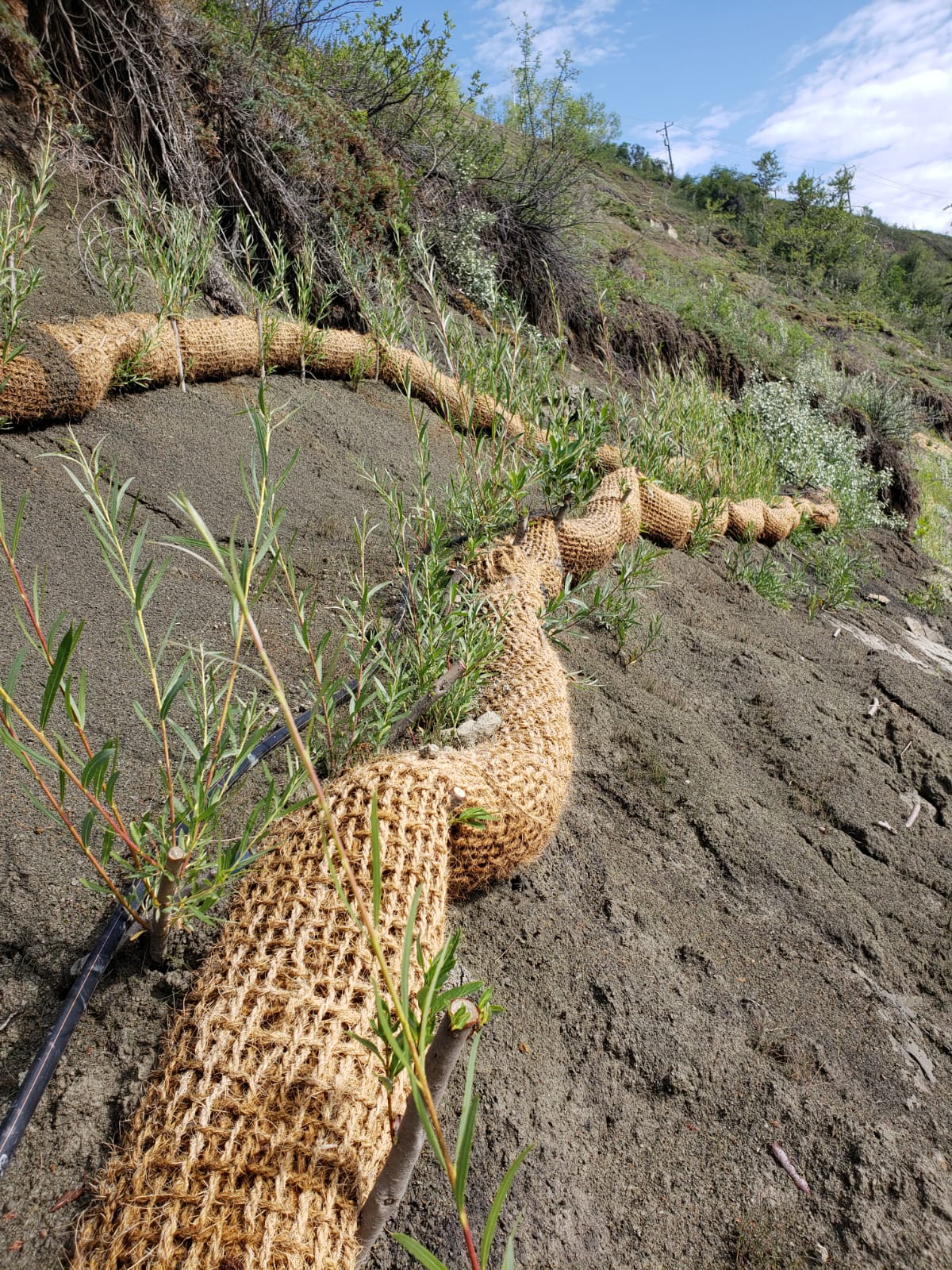
situated downstream of the Glenmore Dam along the Elbow River, Leaf Ninjas undertook a critical mission to address a steep and rapidly eroding section of the river, threatened by river flow and surface runoff. This erosion posed a significant risk to the Enmax transfer station and the regional pathway, jeopardizing their integrity. Importantly, this area of the Elbow River is a vital habitat for trout, underscoring the ecological significance of the project.
The erosion issue was exacerbated by the informal trail created by heavy use of the hillside for river access. To mitigate these risks and enhance the ecosystem, Leaf Ninjas was contracted to close the informal trail using Dirt Bags, extend vegetative cover along the trail (spanning 180 feet), and seed over 20,000 square meters of exposed earth on the cliff's side to reduce overland erosion. Moreover, our team worked diligently to establish riparian plants at the base of the cliff to enhance fish habitat, reinforce riverside erosion control, and stabilize the riverbank.
Access to the project site was a challenging feat, requiring boat access, rope access, and the transportation of materials down a steep 180-meter slope. Following the successful construction phase, we committed to a comprehensive three-year program, including maintenance, monitoring, and implementation of solar irrigation systems, ensuring the long-term health and sustainability of the project while protecting the vital trout habitat and critical infrastructure.
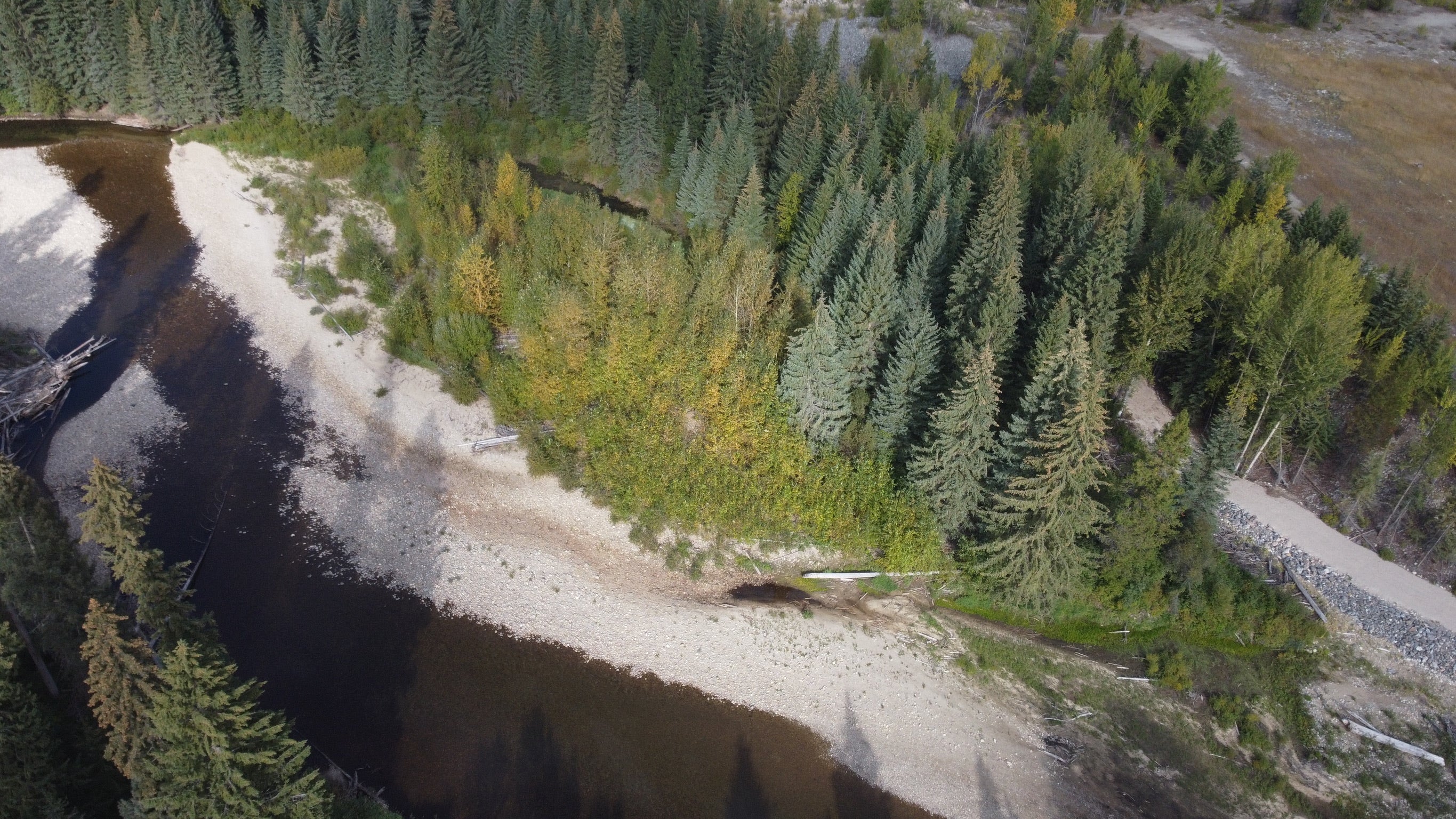
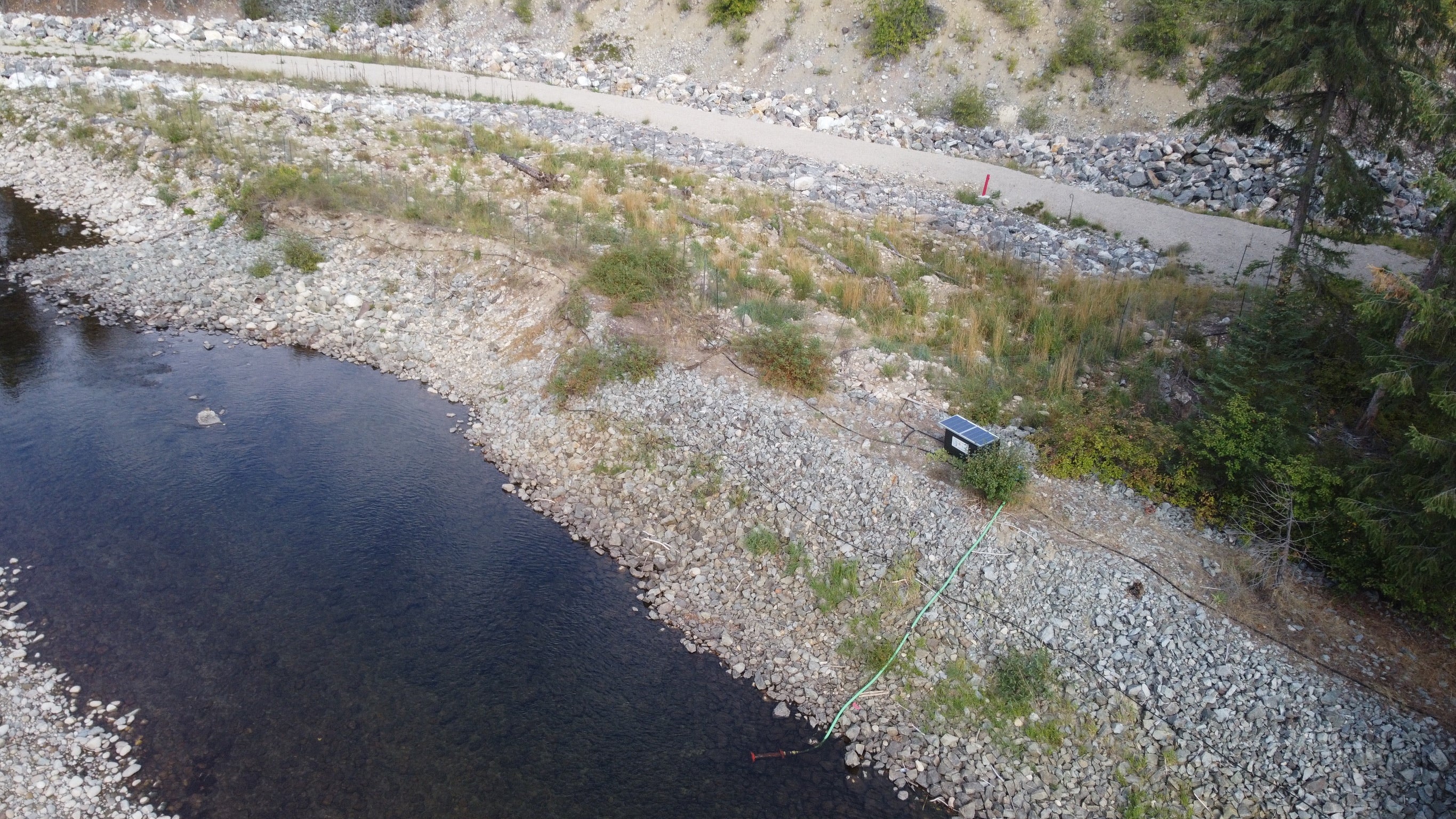
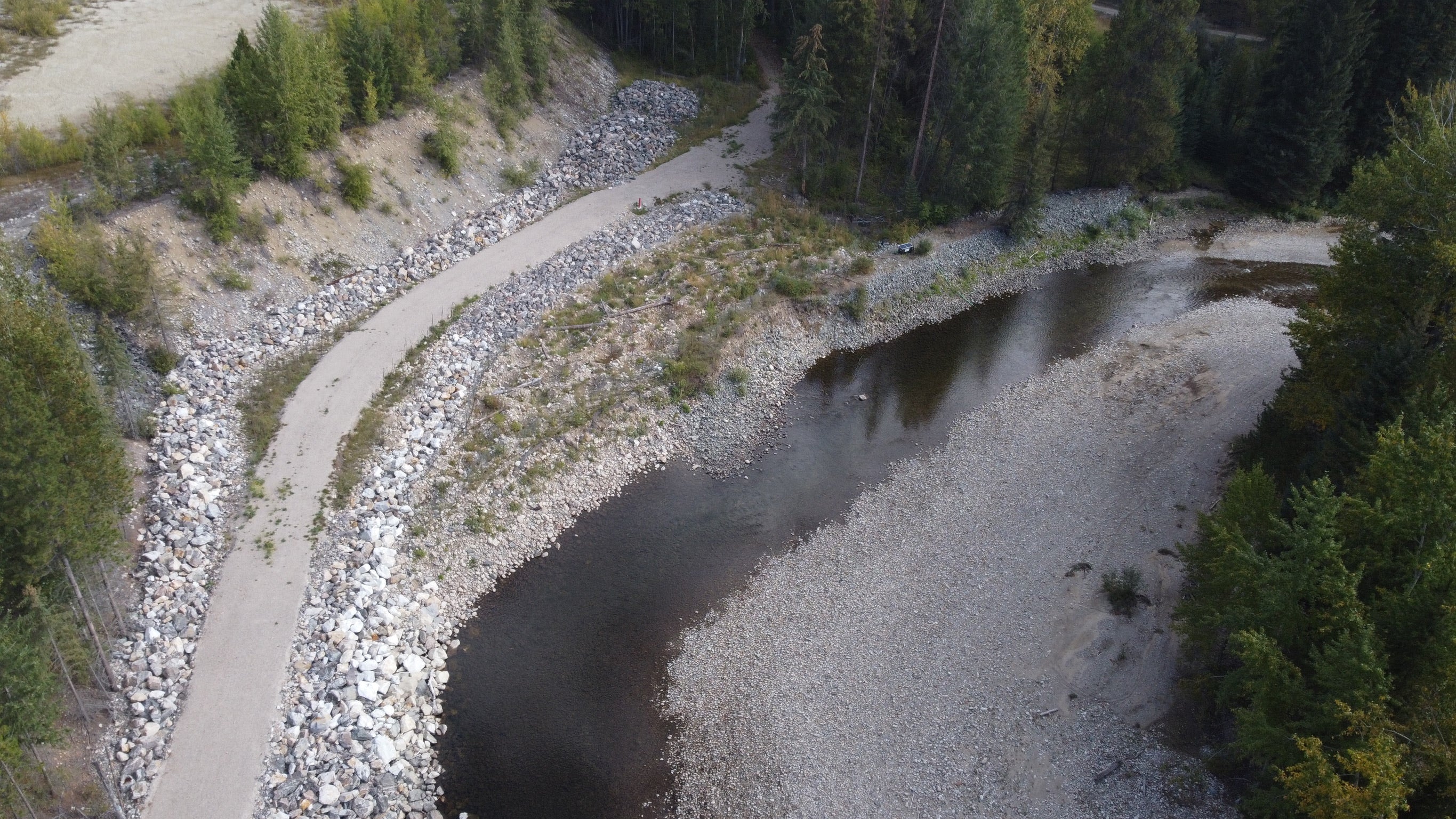
Situated a challenging 9-hour drive from Leaf Ninjas headquarters, this project required the installation of a remote solar irrigation system to bolster the establishment of over 3,500 native plants. The endeavour was distinguished by its threefold mission: creating additional fish habitat for Department of Fisheries and Oceans (DFO) offsetting purposes, stabilizing the riverbank, and reintroducing essential vegetation cover that had been lacking in the area.
Leaf Ninjas' pioneering remote solar irrigation system demonstrated the effectiveness of plant establishment activities, showcasing that irrigation can be efficiently carried out even from substantial distances, reinforcing our capacity to manage and support projects with geographical challenges.
This project underscores our commitment to ecological restoration and the revitalization of vital habitats, even in remote and logistically demanding locations.
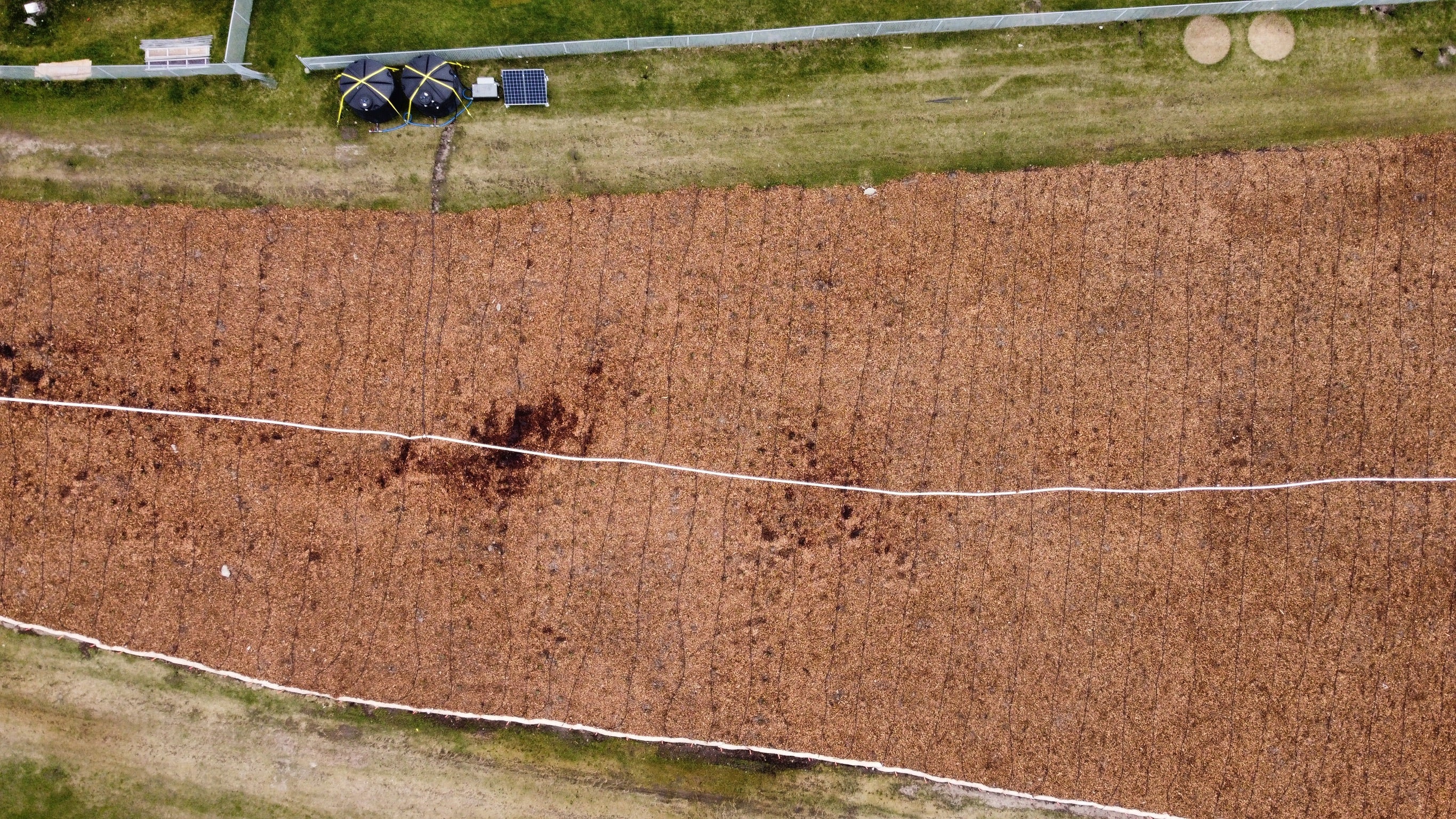
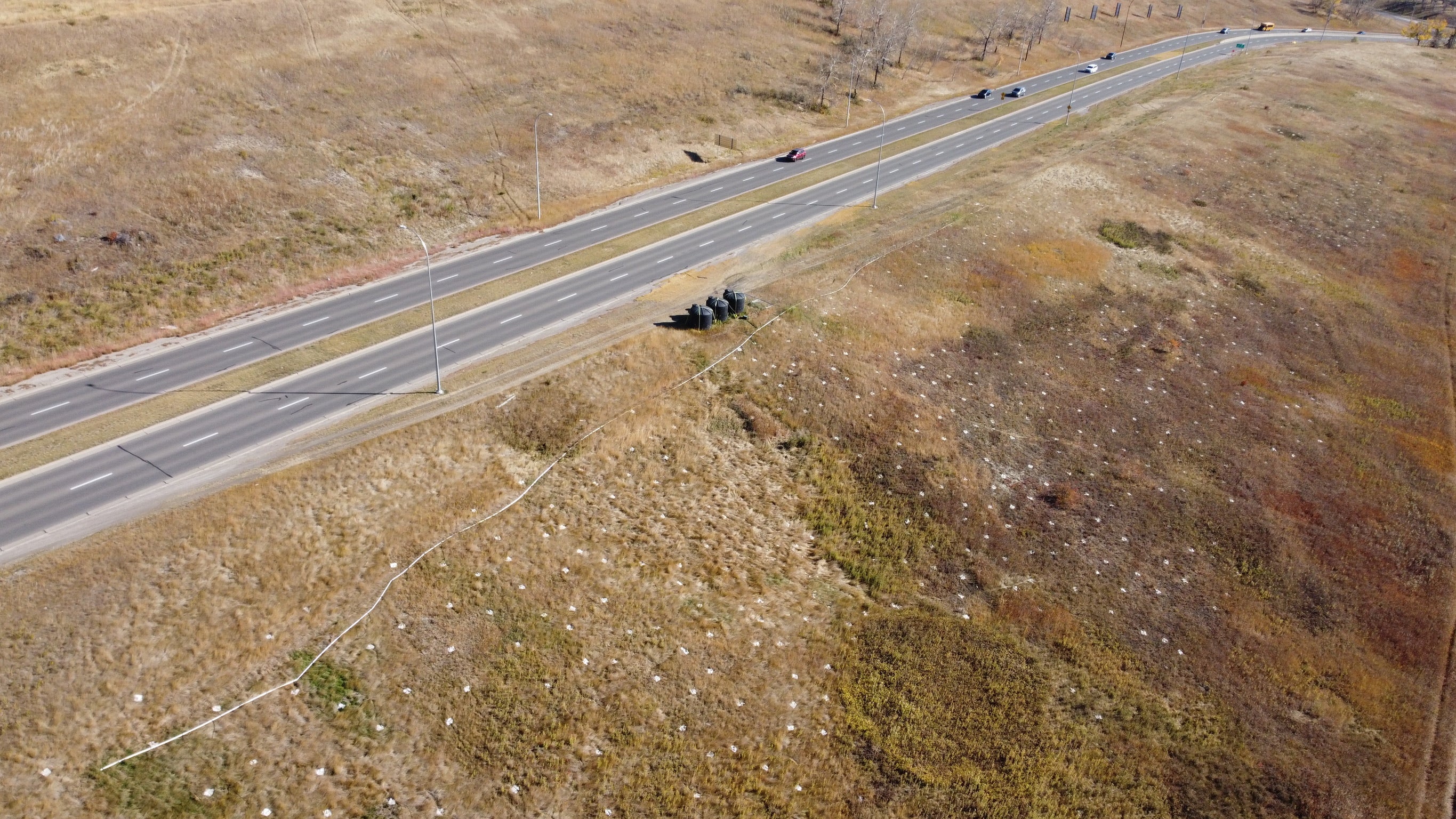
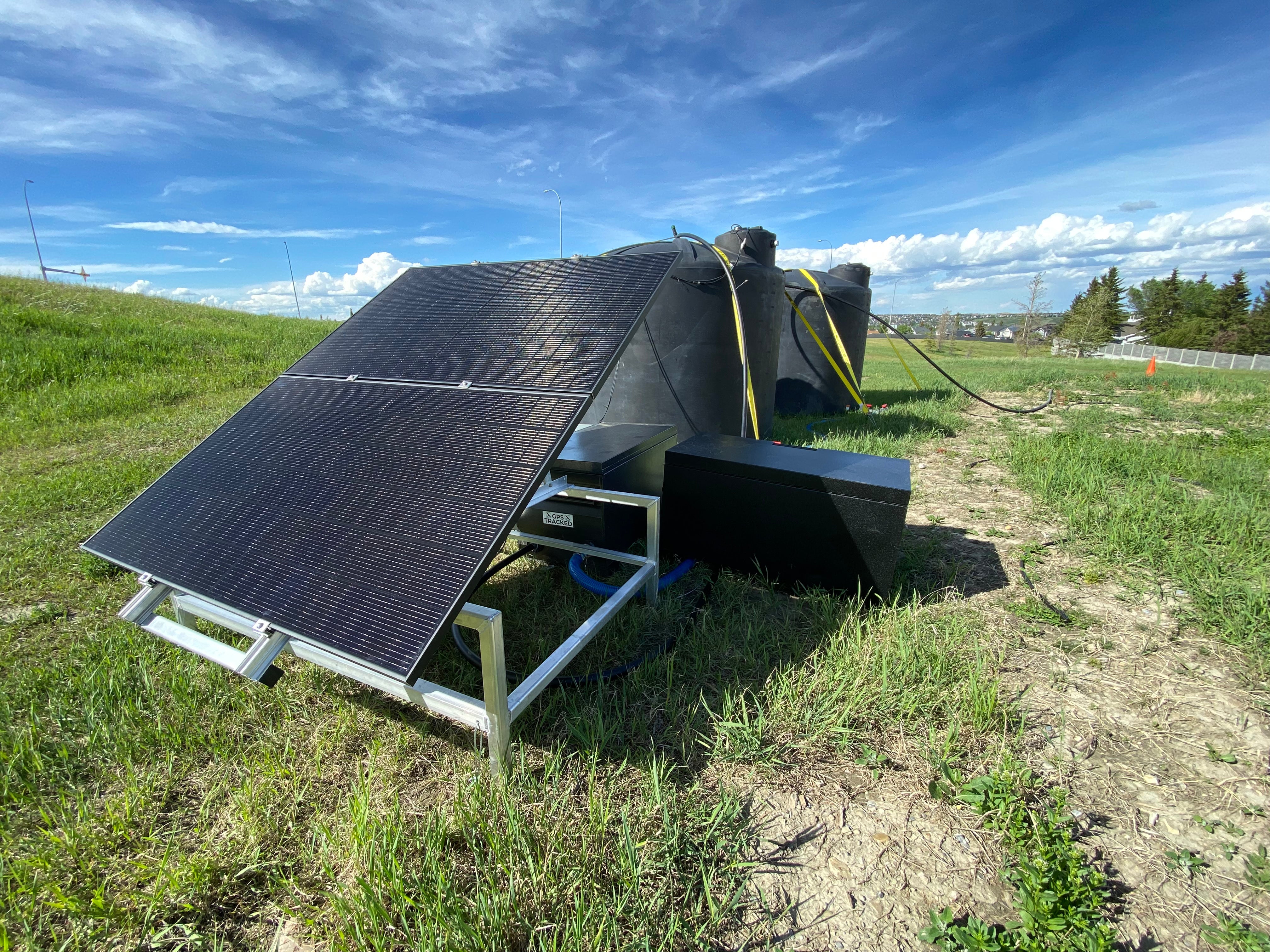
This ingenious system comprised 20,000-30,000 liters of water tank storage per site, seamlessly integrated with our proprietary remote solar irrigation technology. The system operated a drip irrigation network to provide consistent hydration to all plantings. In an effort to maintain optimal water levels in the tanks, a float sensor was incorporated, which automatically triggered an email notification to the water truck company when levels were low, ensuring the continuous and adequate irrigation of the plantings.
Leaf Ninjas played a crucial role in supporting the City of Calgary's ambitious afforestation efforts under the canopy expansion program. Our involvement encompassed the active irrigation, monitoring, and maintenance of six designated sites, where each square meter featured the planting of one tree or shrub. Recognizing the high failure rates, often attributed to water scarcity, limited water truck range, or the absence of accessible water sources, we embarked on an innovative solution. To counter these challenges, Leaf Ninjas developed a cutting-edge solar irrigation tank system, specifically designed to facilitate the establishment of these sites in areas with no immediate water access.
The initial program commenced with three sites on a year-by-year basis. The remarkable success of this endeavour led to an expansion of the primary site, the addition of three more sites, and an extension of the service agreement through 2025. This project exemplifies Leaf Ninjas' commitment to environmental sustainability and innovative solutions, reinforcing the vitality of urban afforestation initiatives.
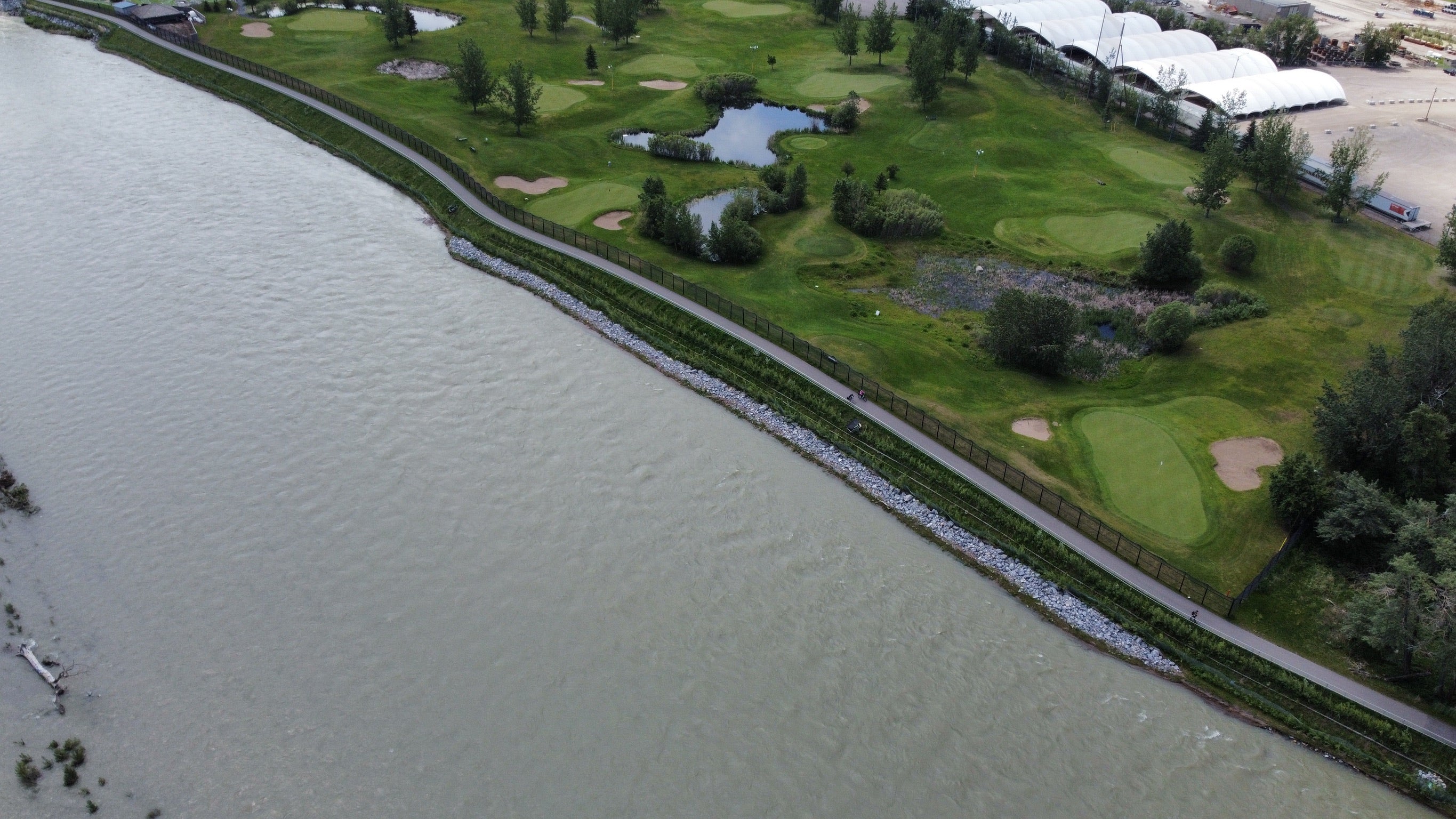

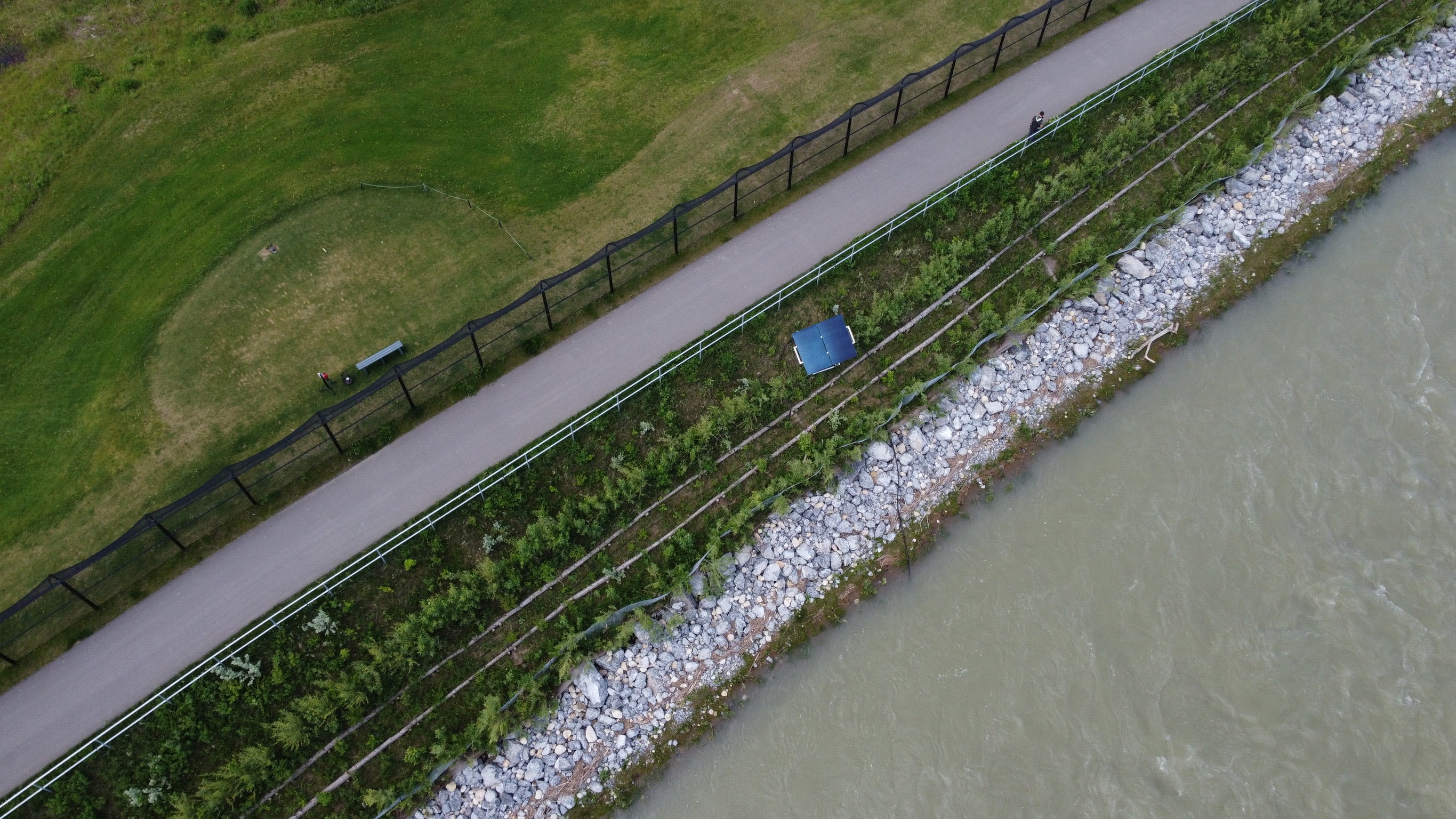
Leaf Ninjas took on a pivotal role in facilitating the establishment of more than 20,000 native plants as part of a bank stabilization project. This comprehensive effort involved the strategic use of live stakes, plugs, and container plants, implemented within a diverse range of bioengineering and riparian vegetation methods.
The project site bore significance as it supported critical infrastructure, but had endured severe damage during the devastating 2013 flooding event. In response to the unique challenges of the project, Leaf Ninjas innovatively designed and installed a remote solar irrigation system.
This system played a central role in providing crucial support for vegetation and seed establishment over a span of three years, ensuring the project's long-term success and the restoration of the damaged site. This endeavour exemplifies our dedication to environmental sustainability, the protection of critical infrastructure, and the resilience of communities in the face of natural disasters.
